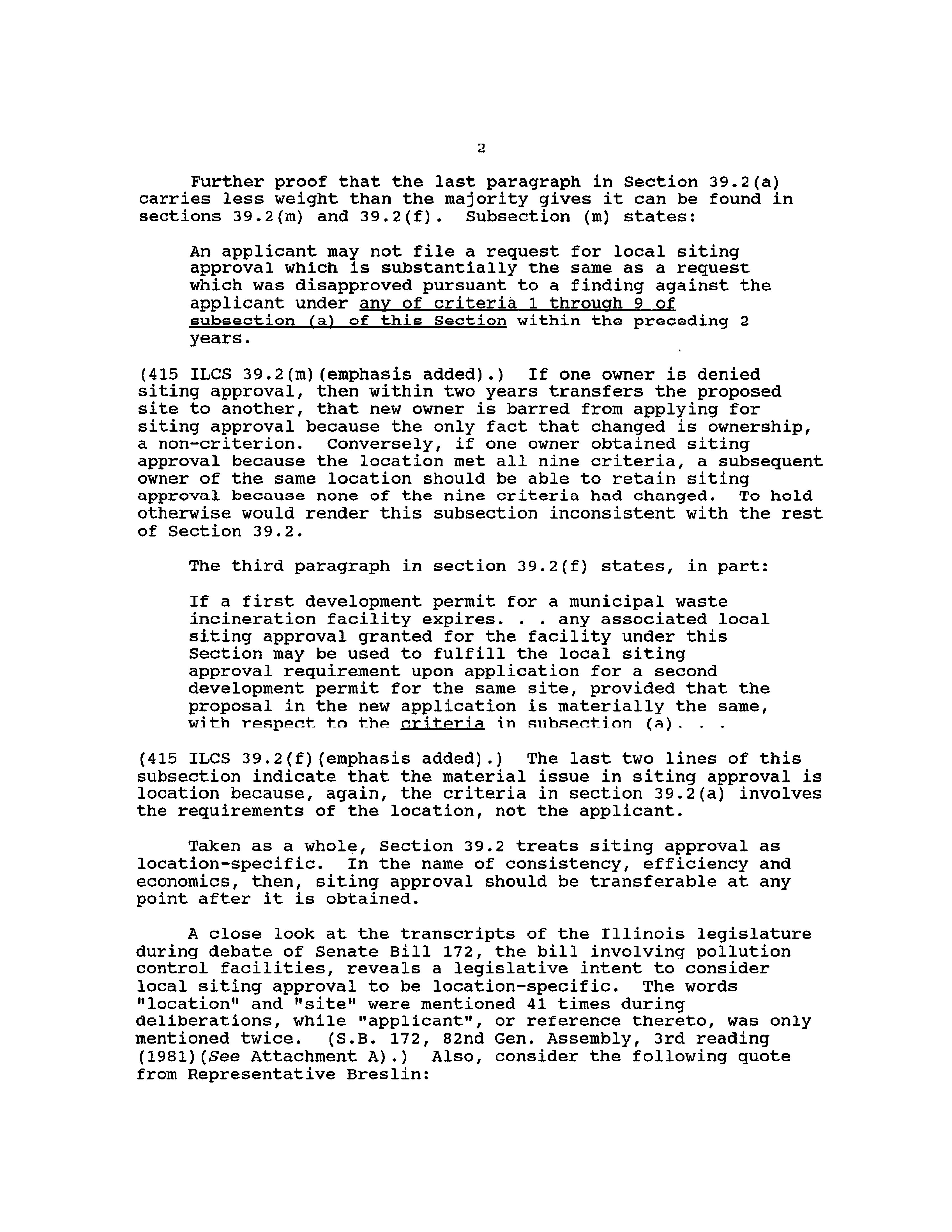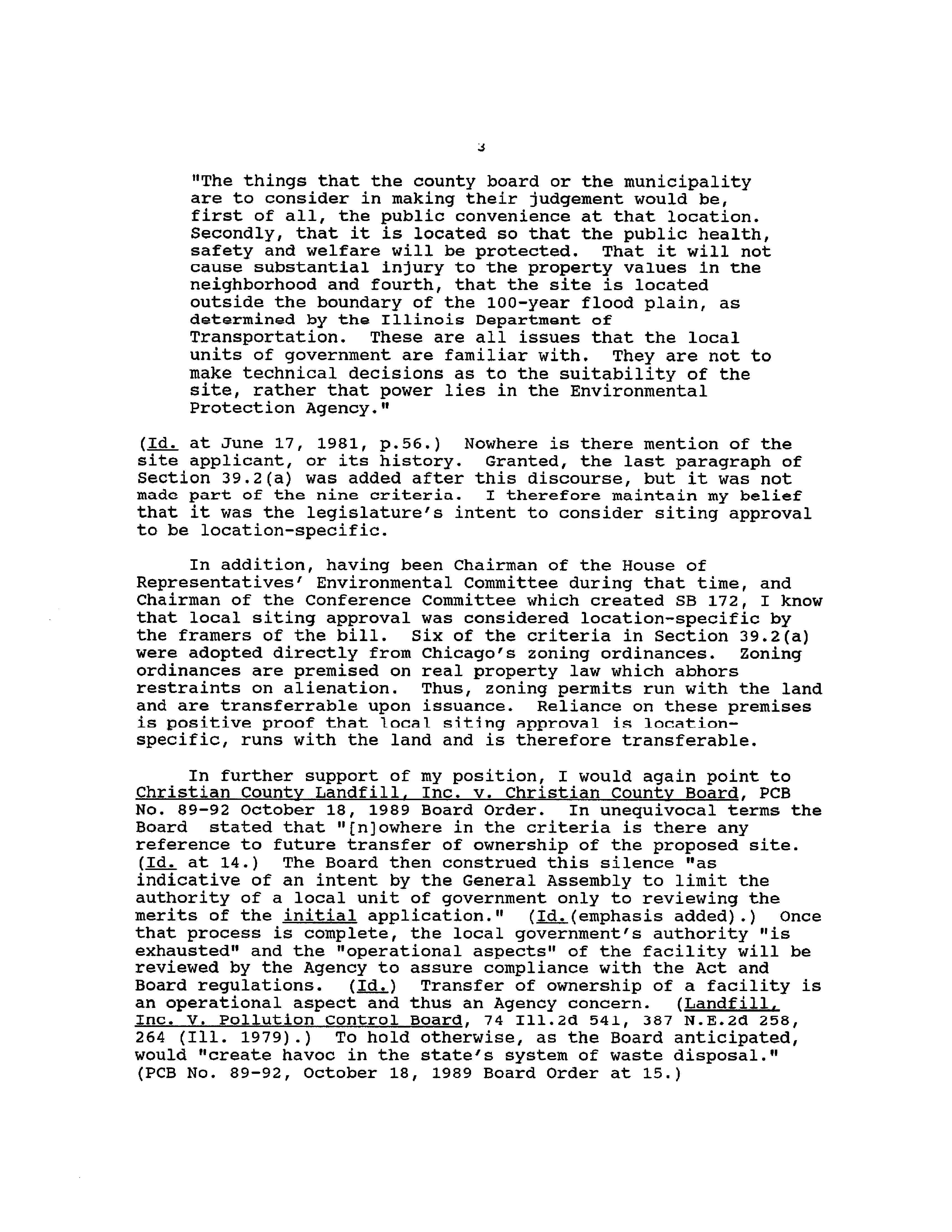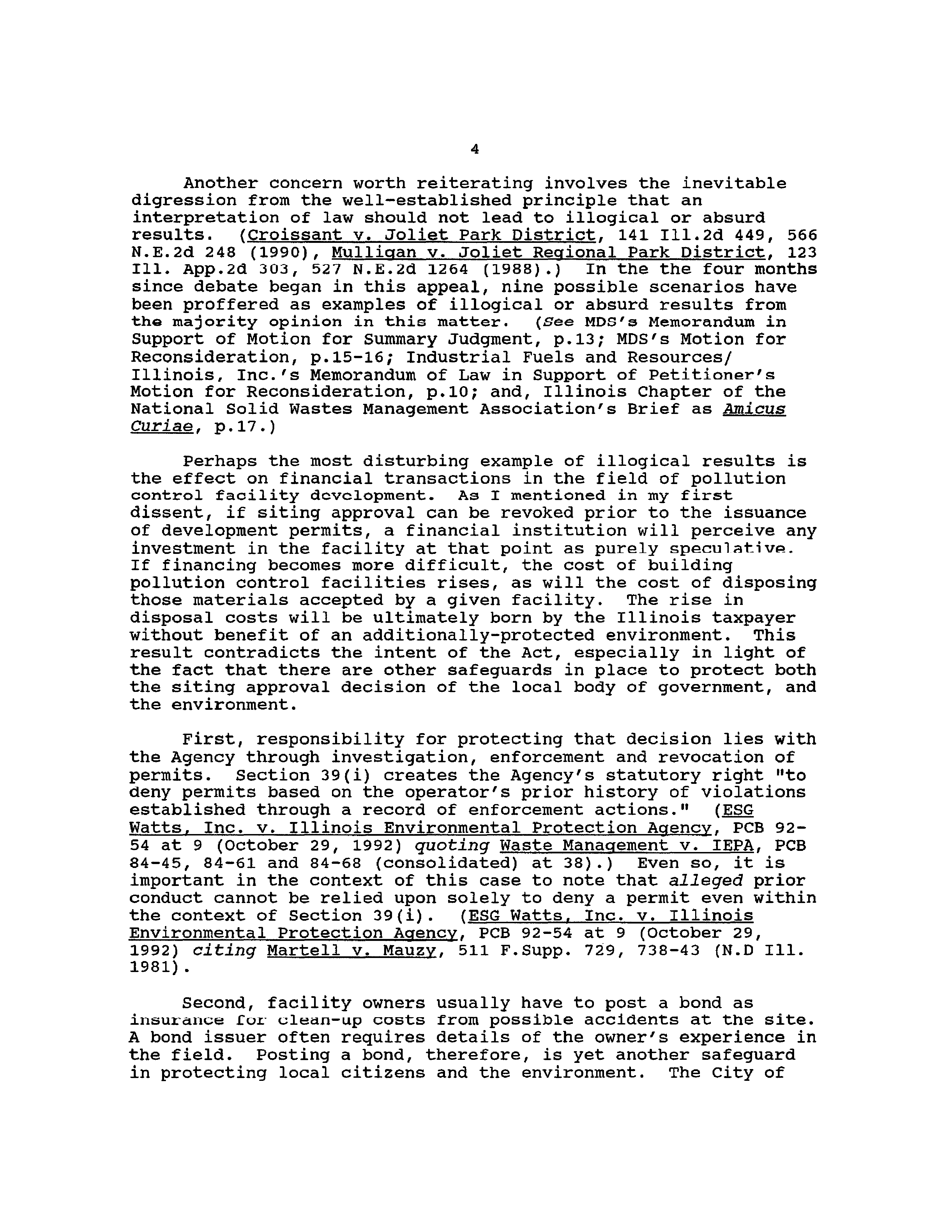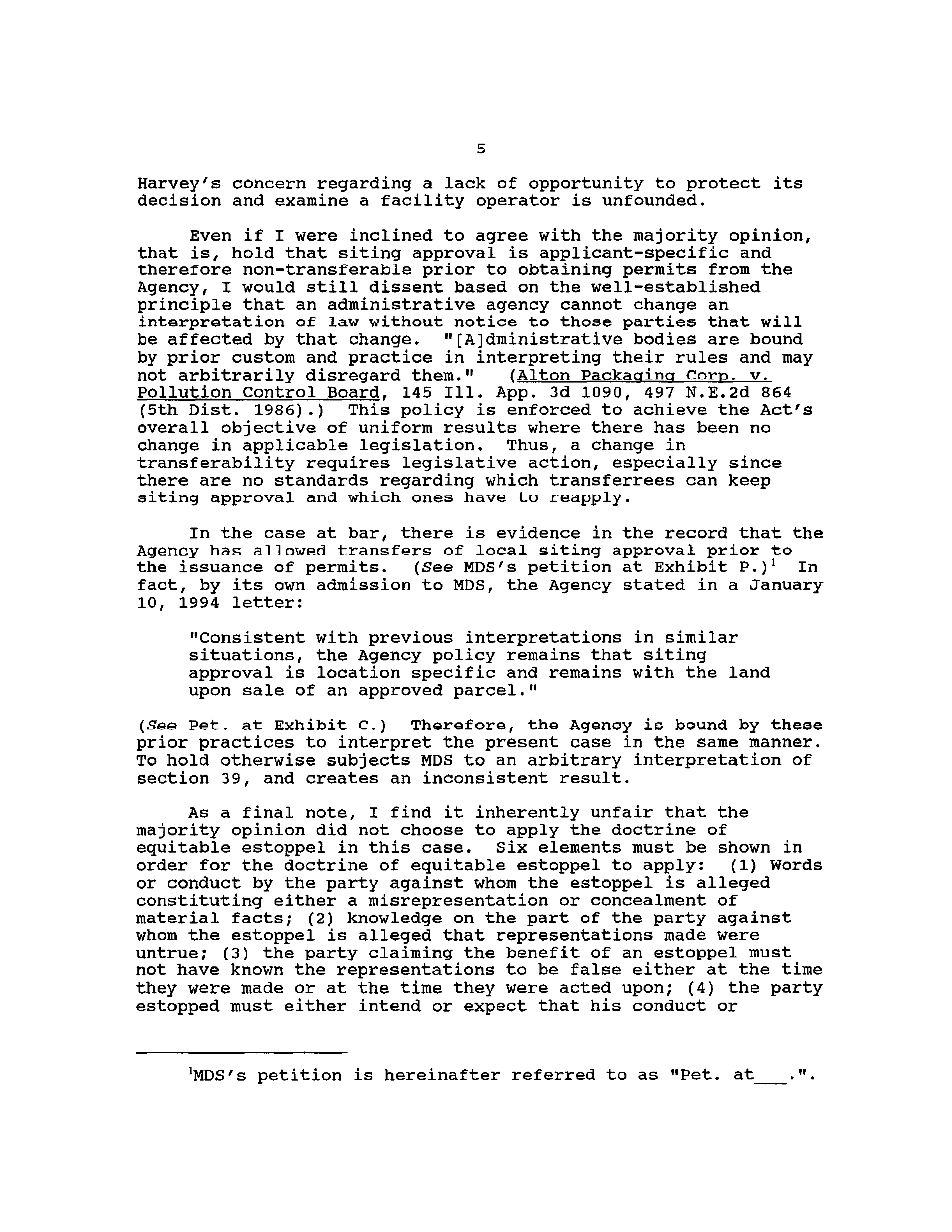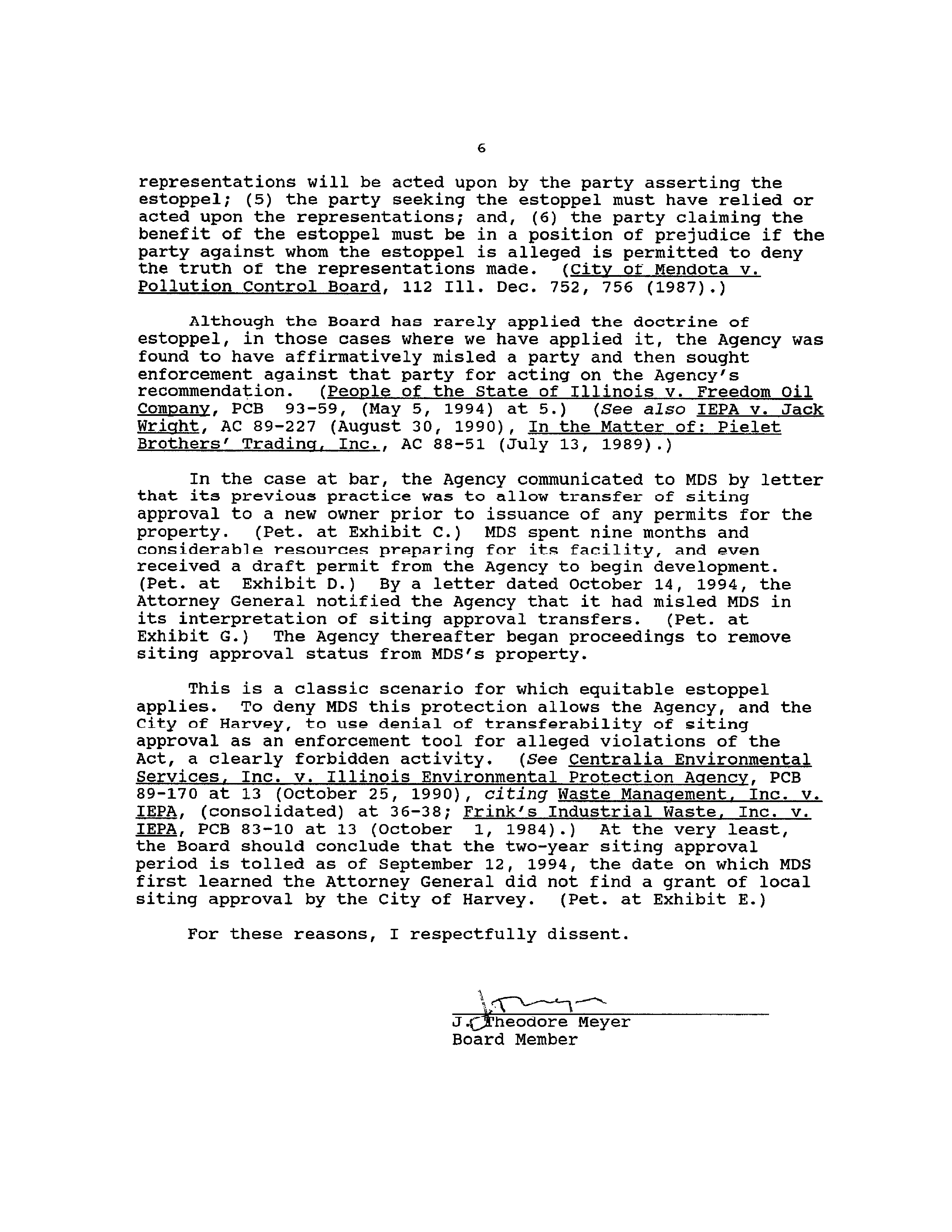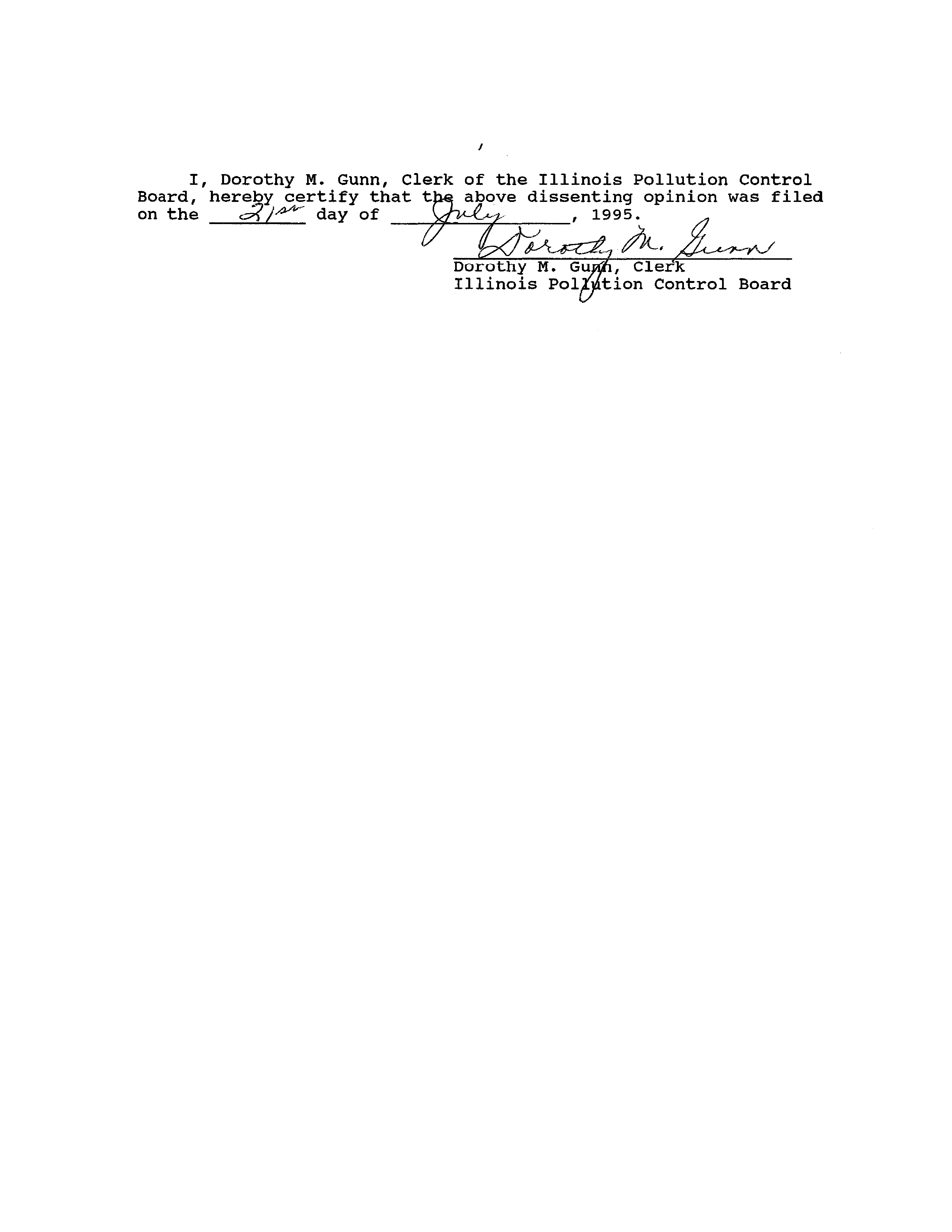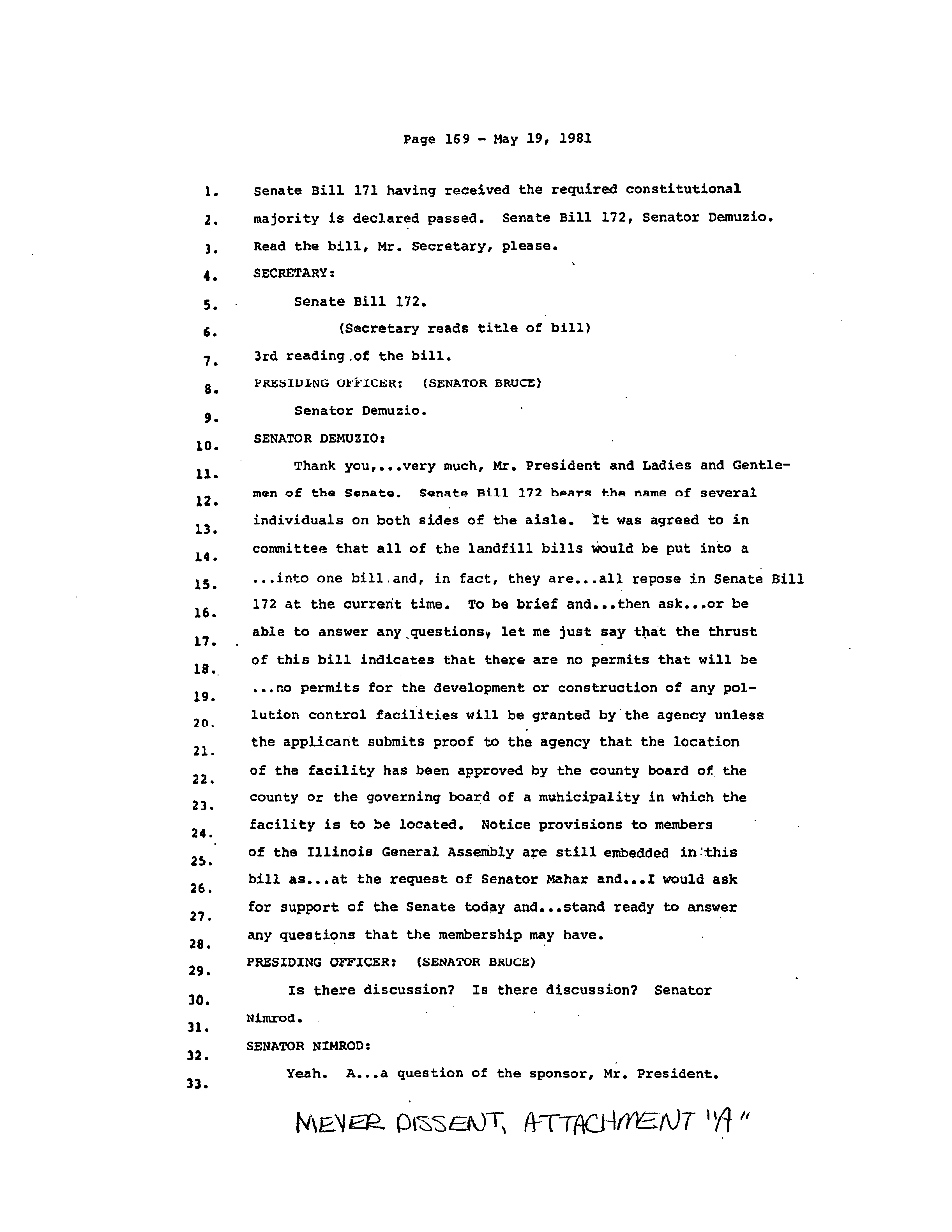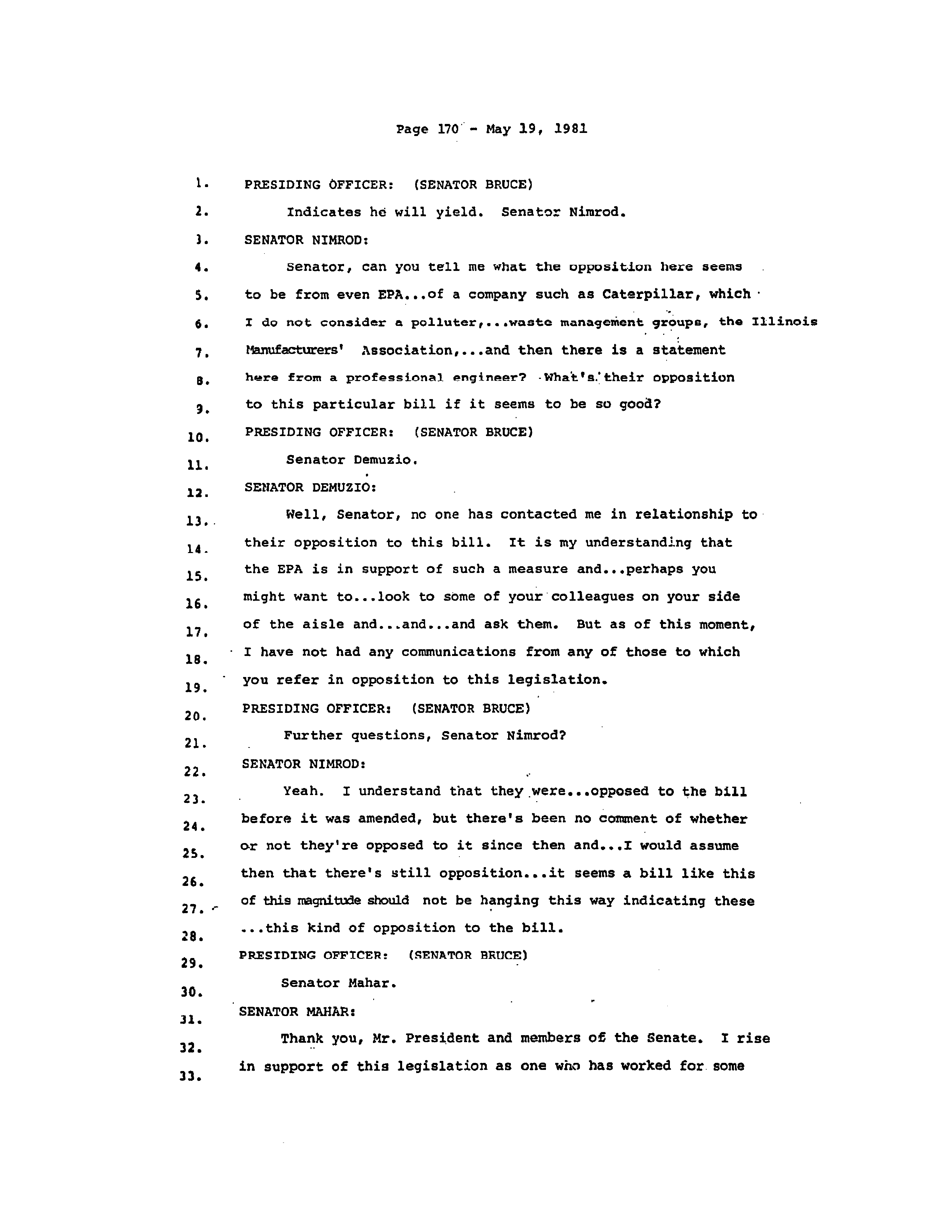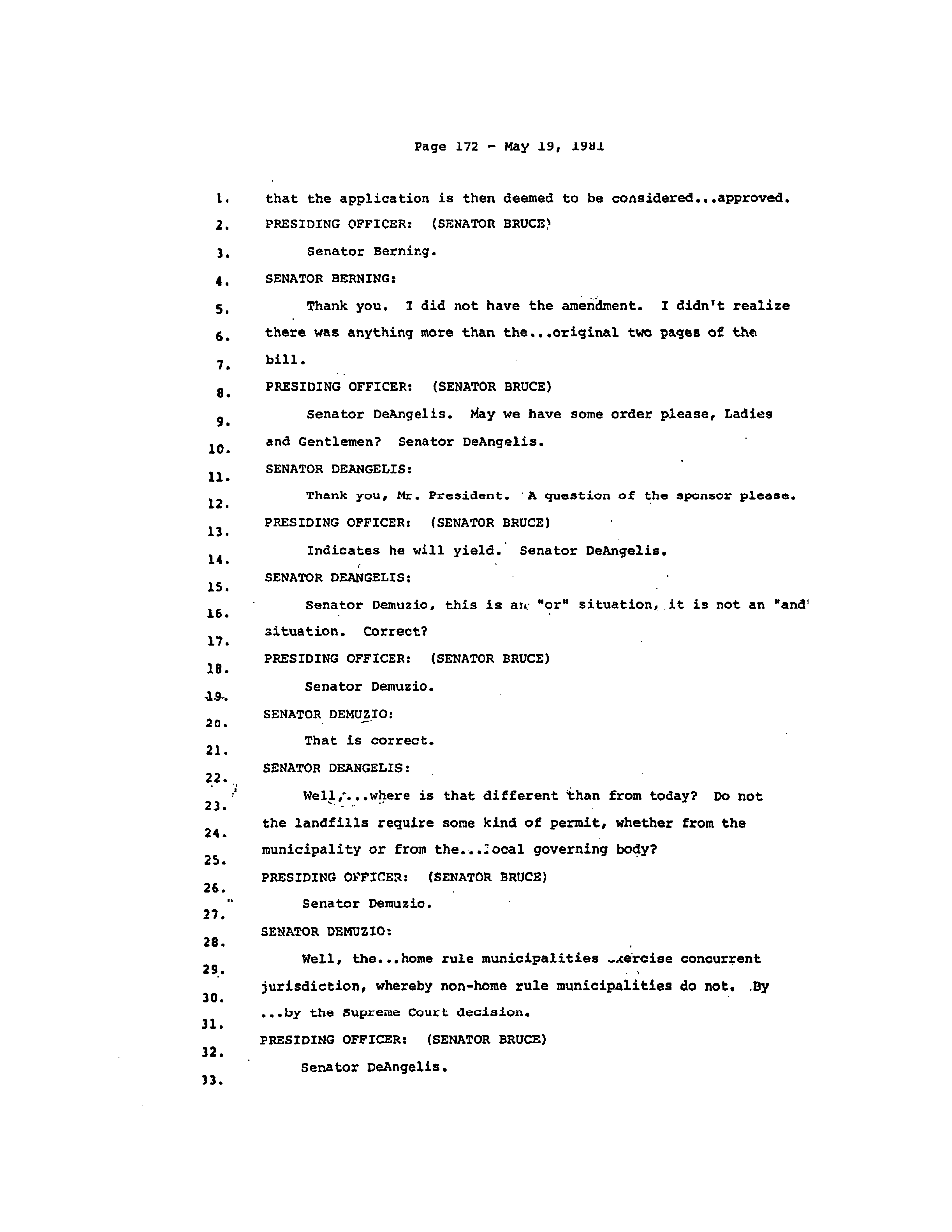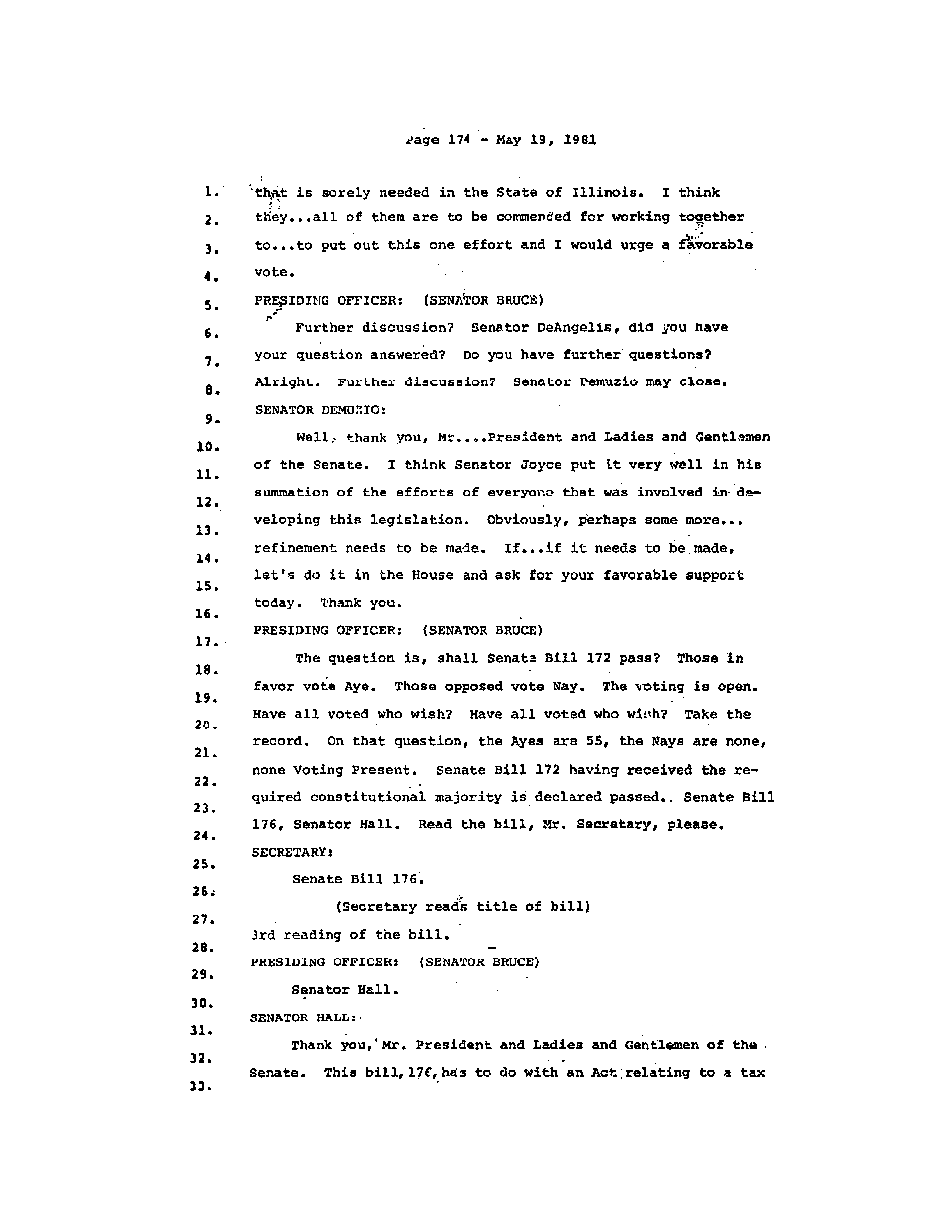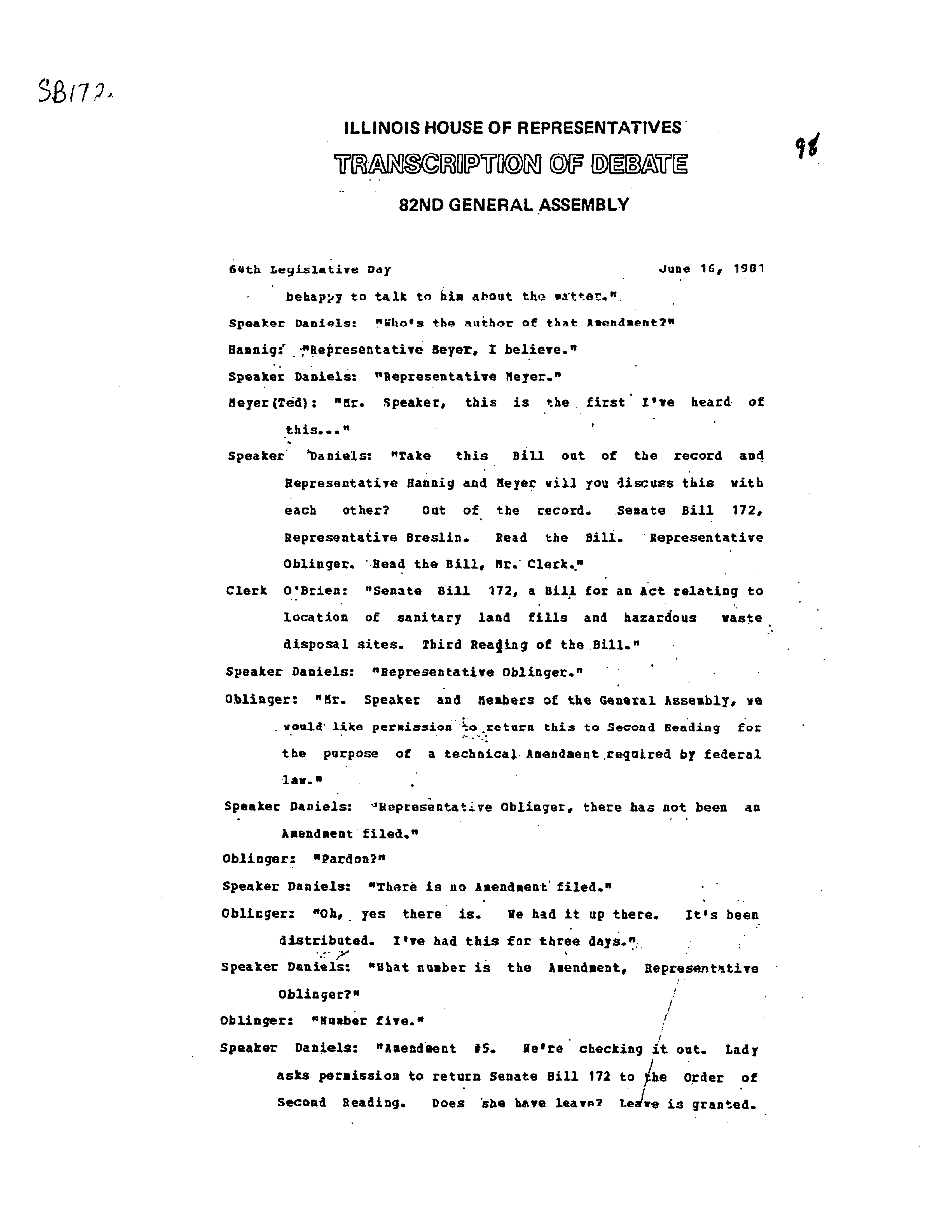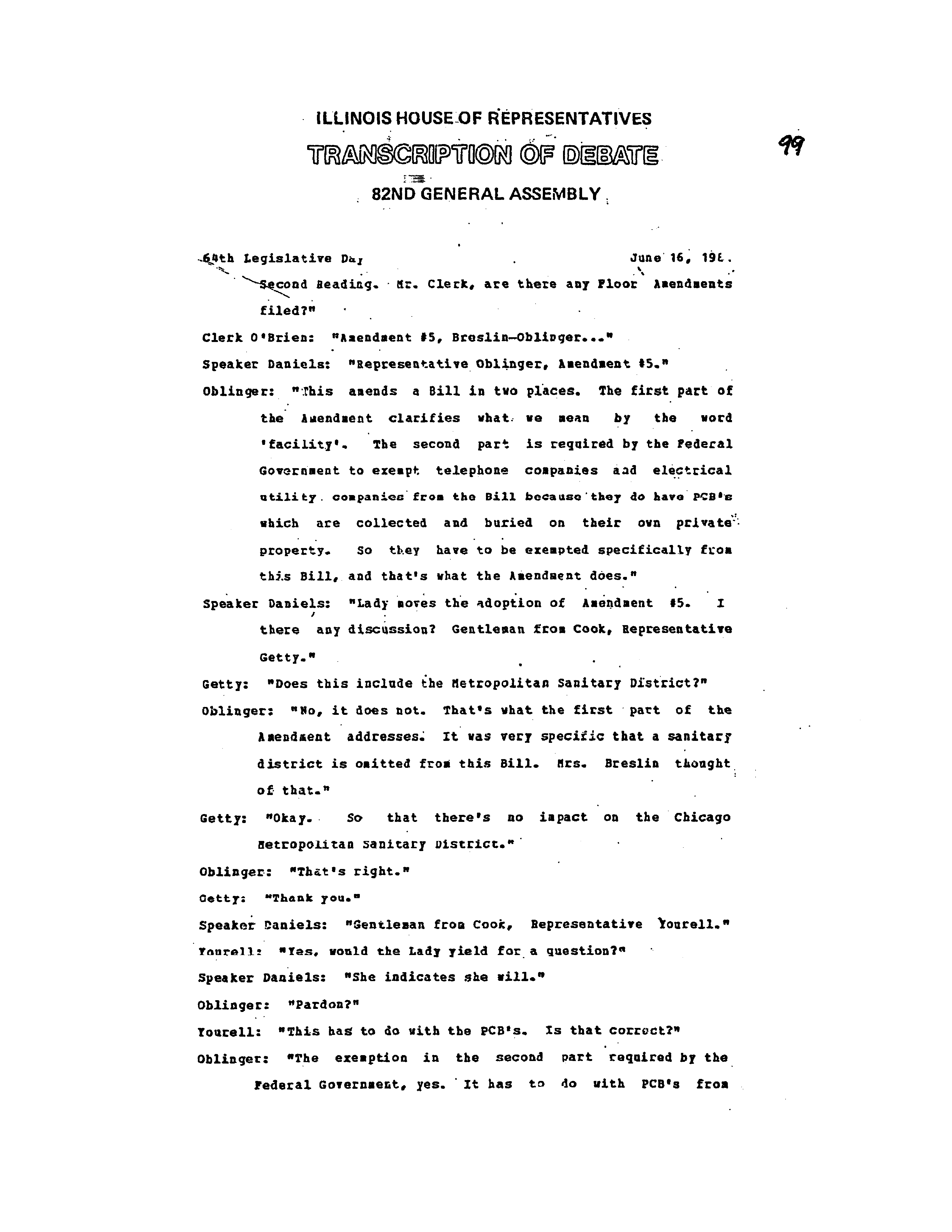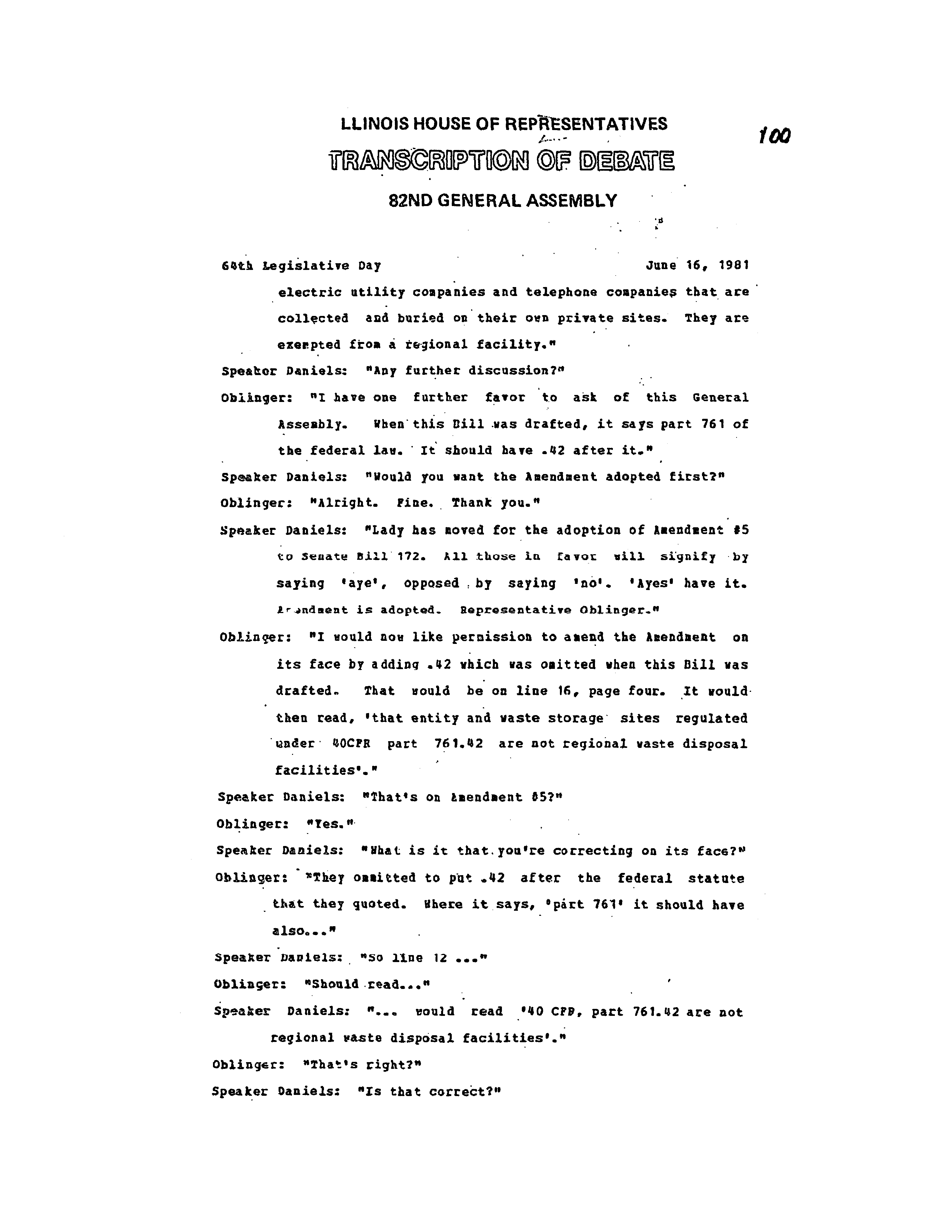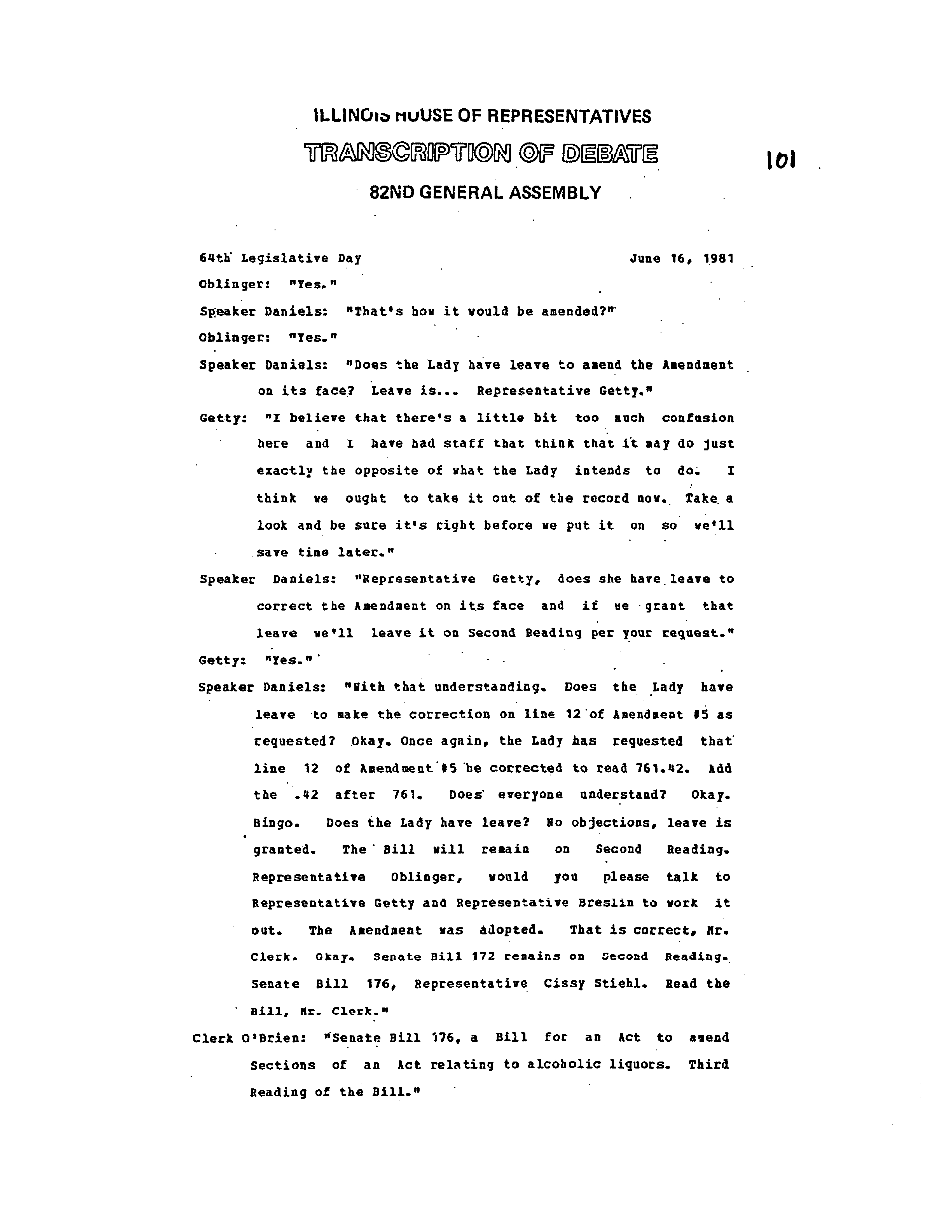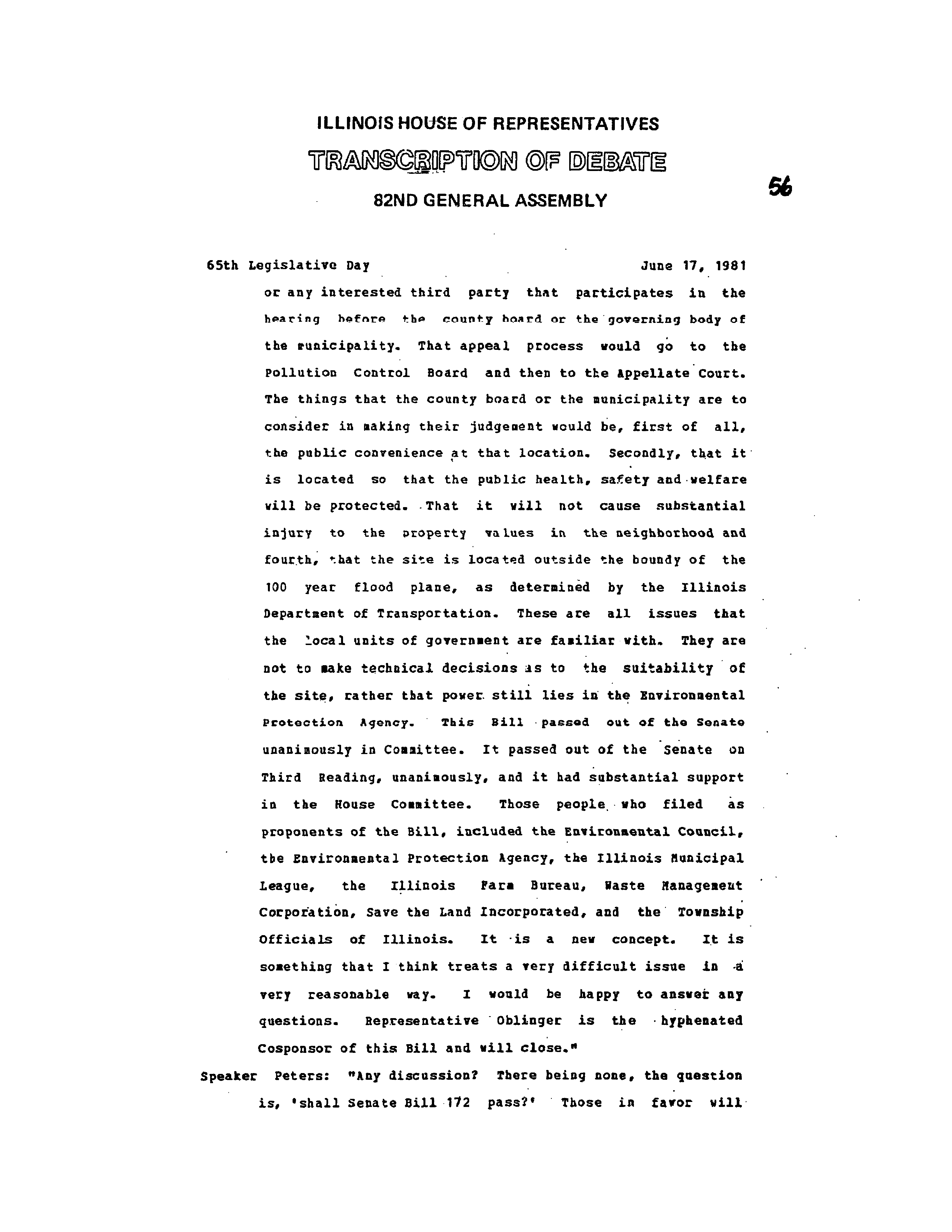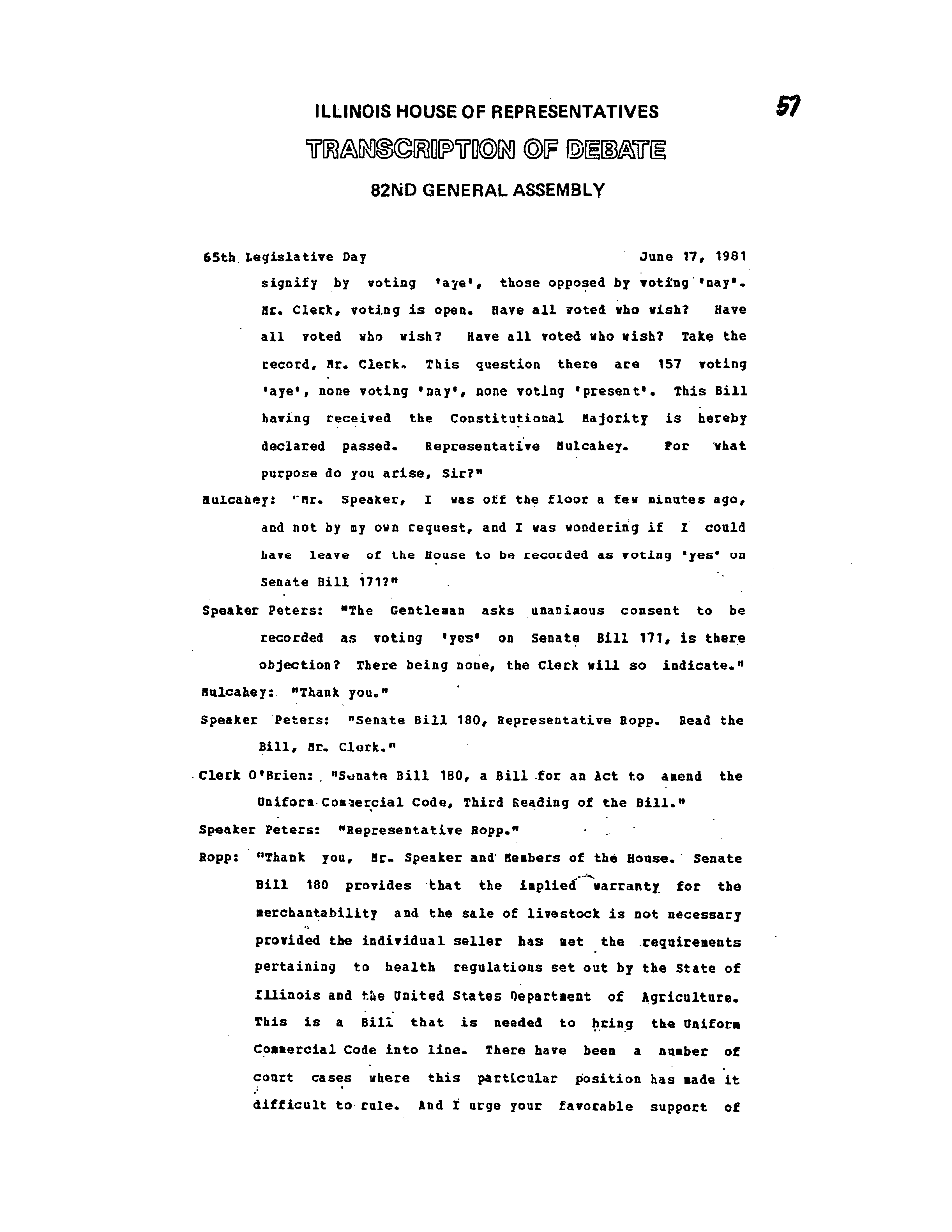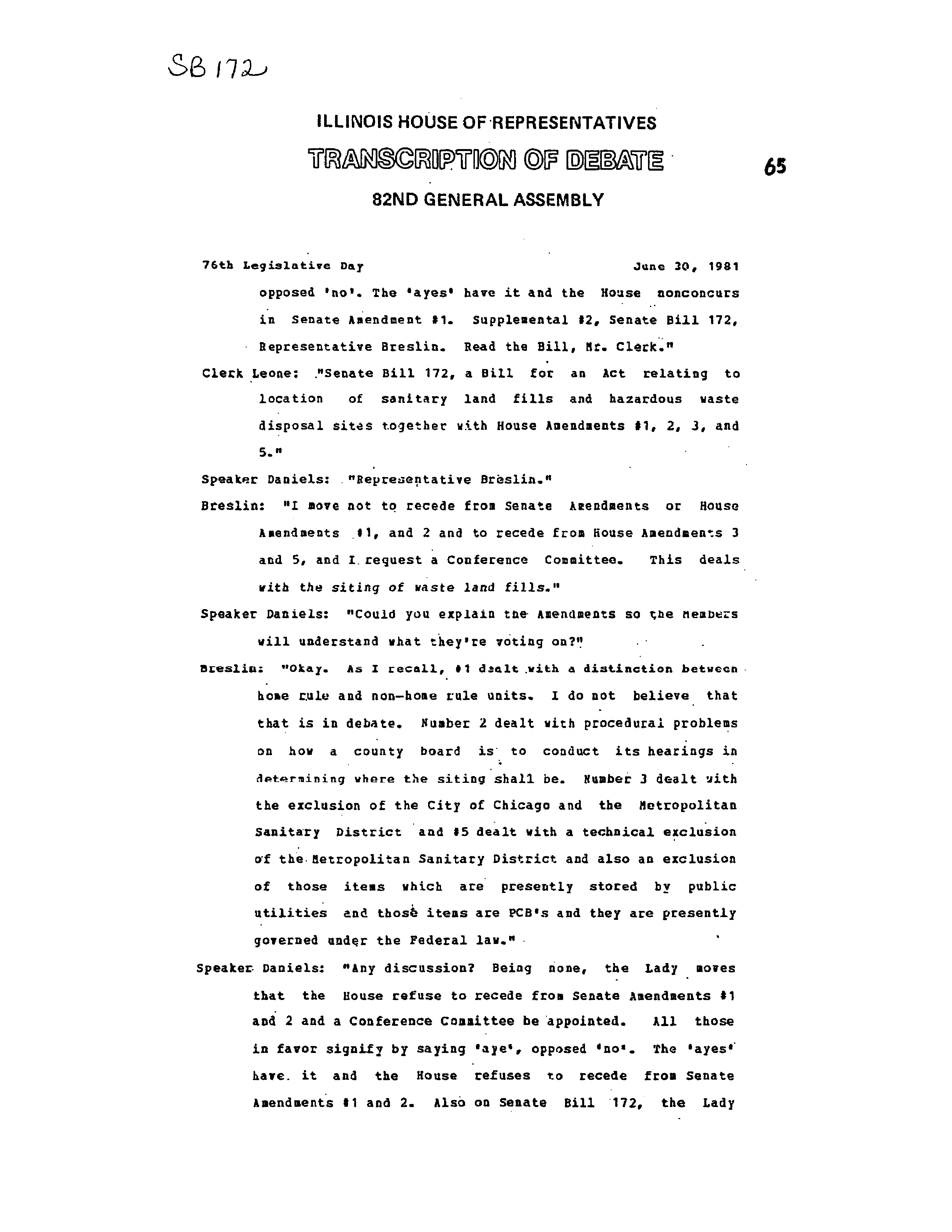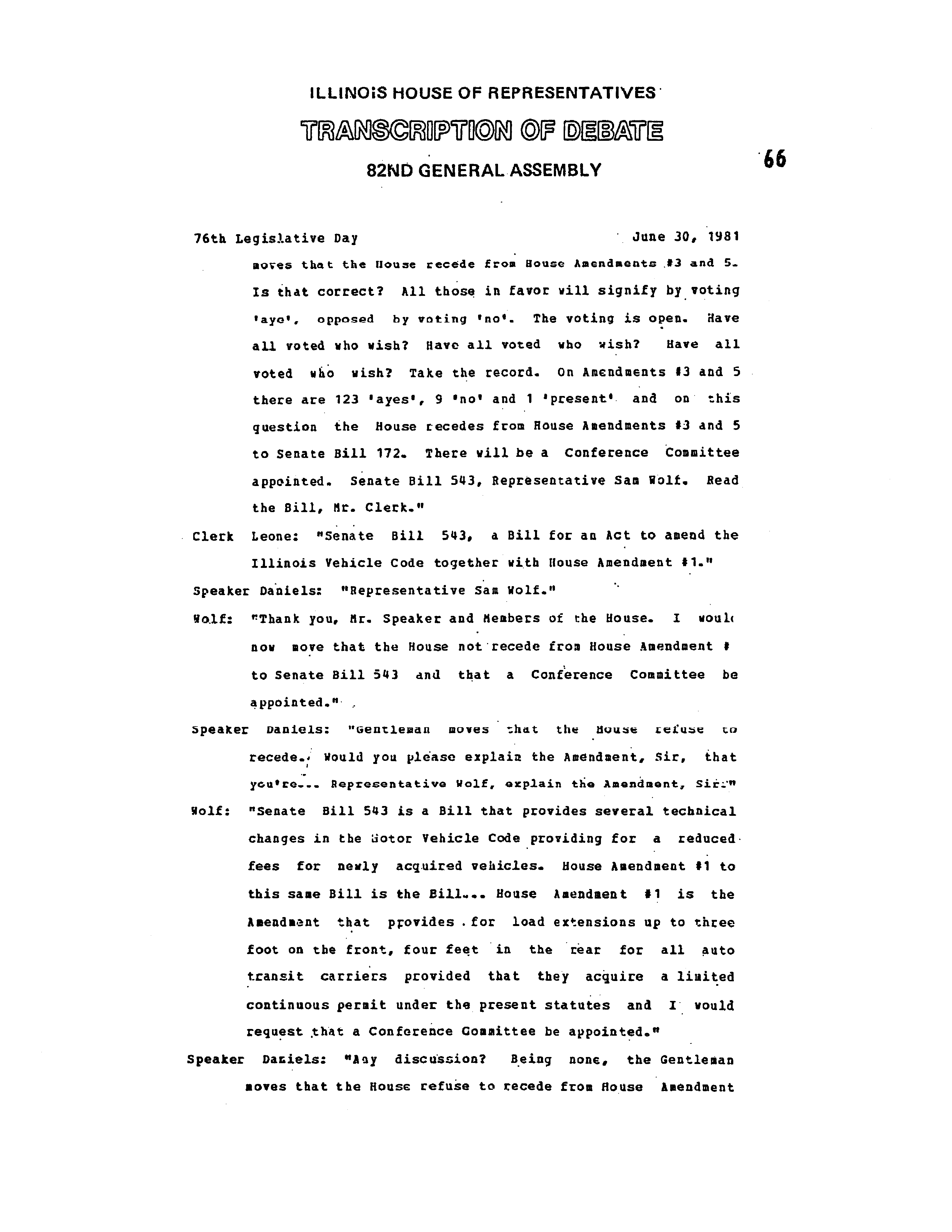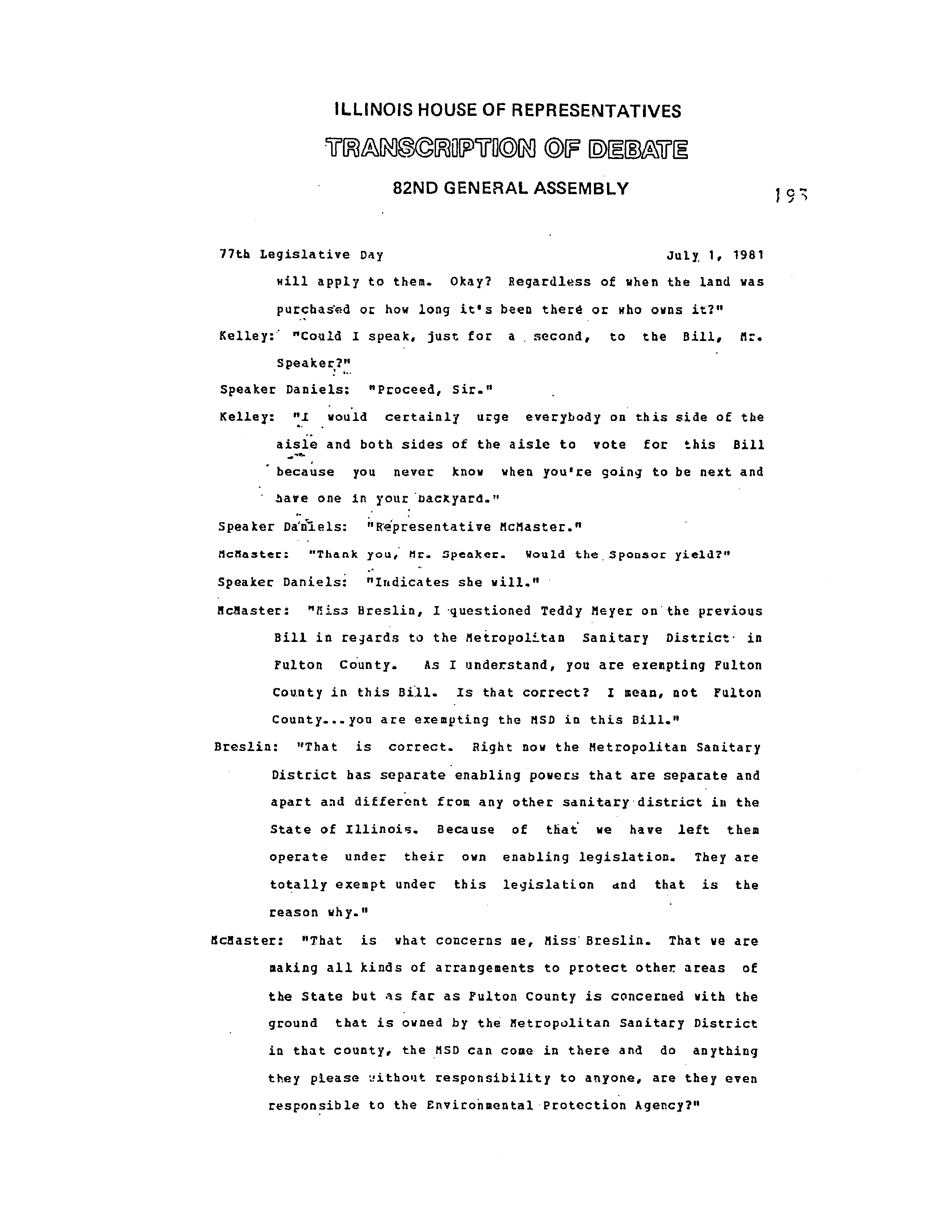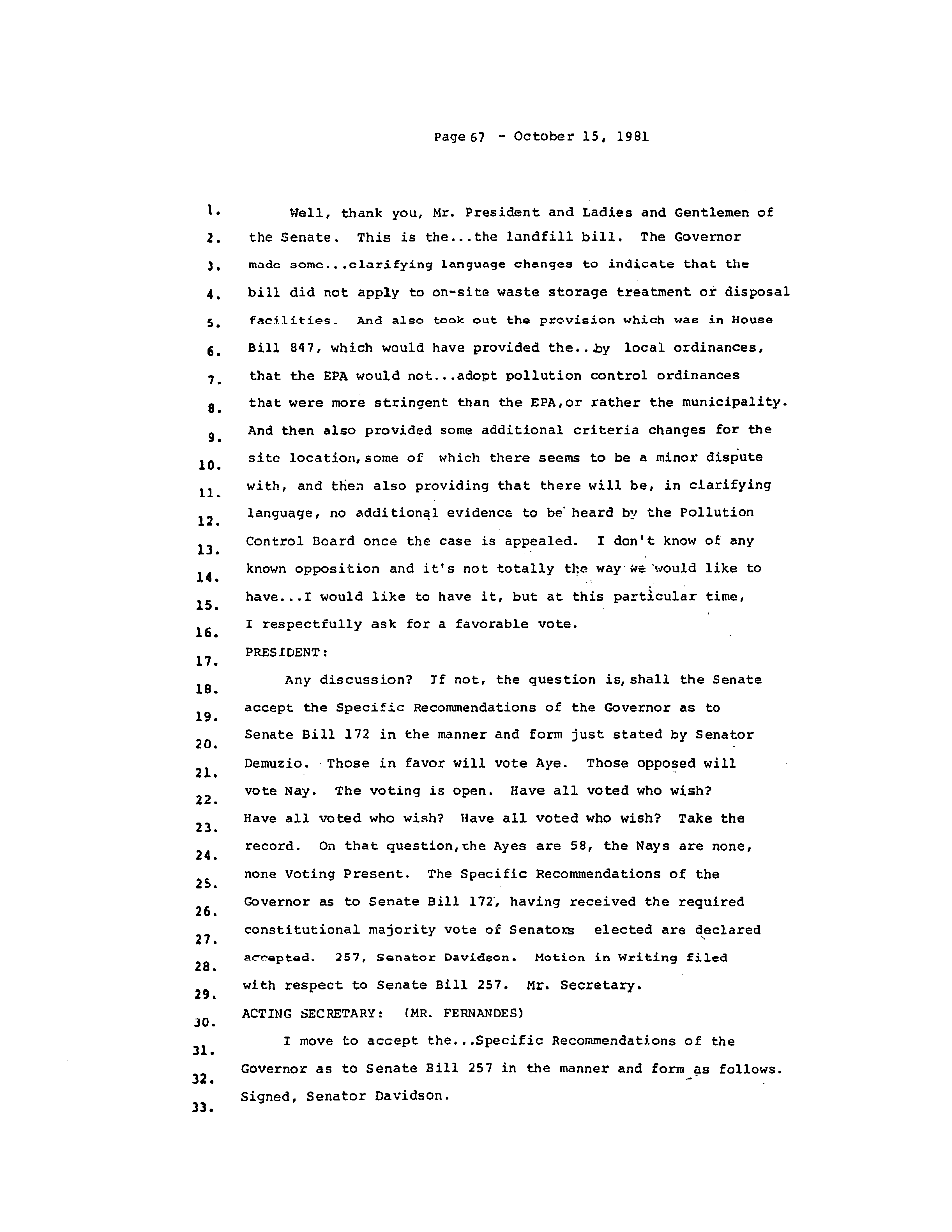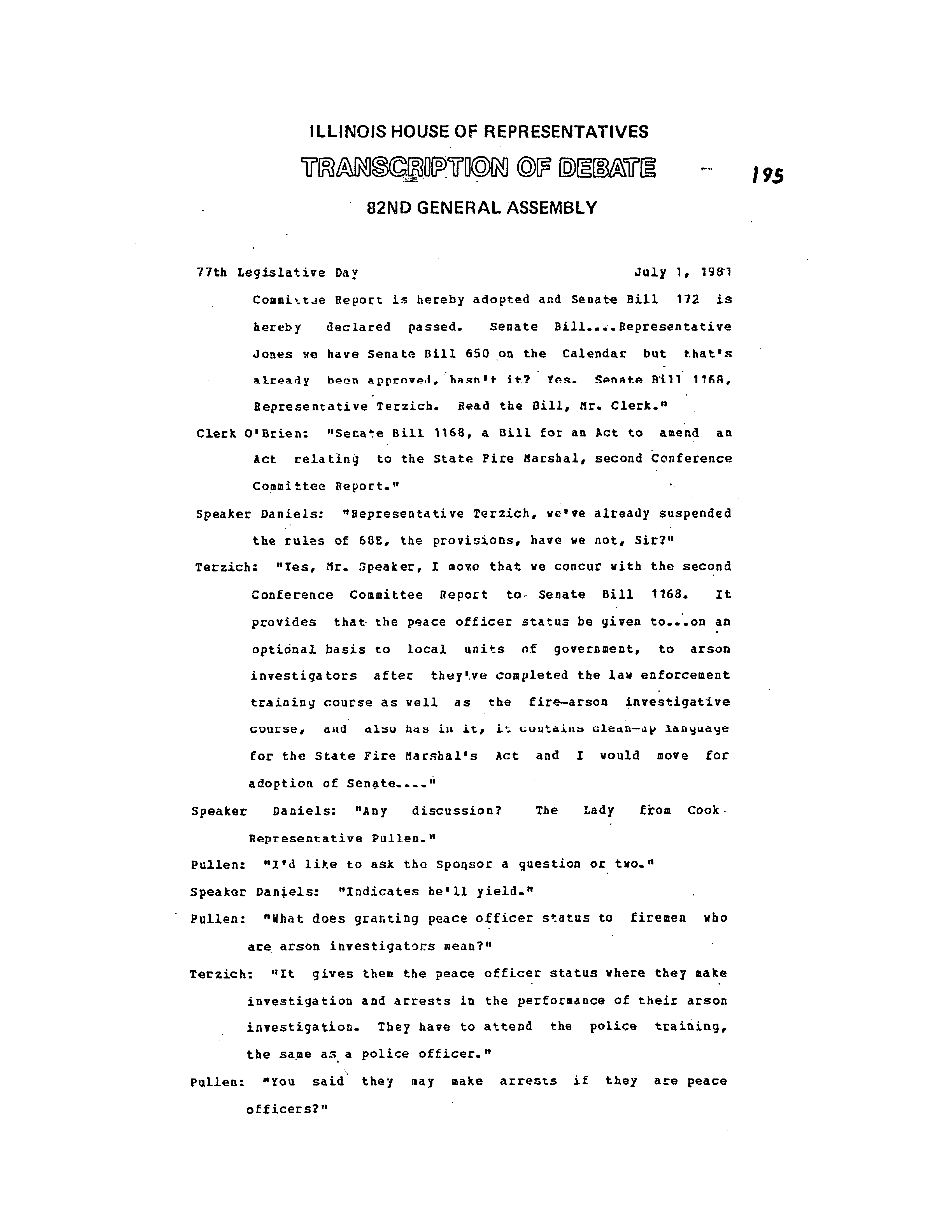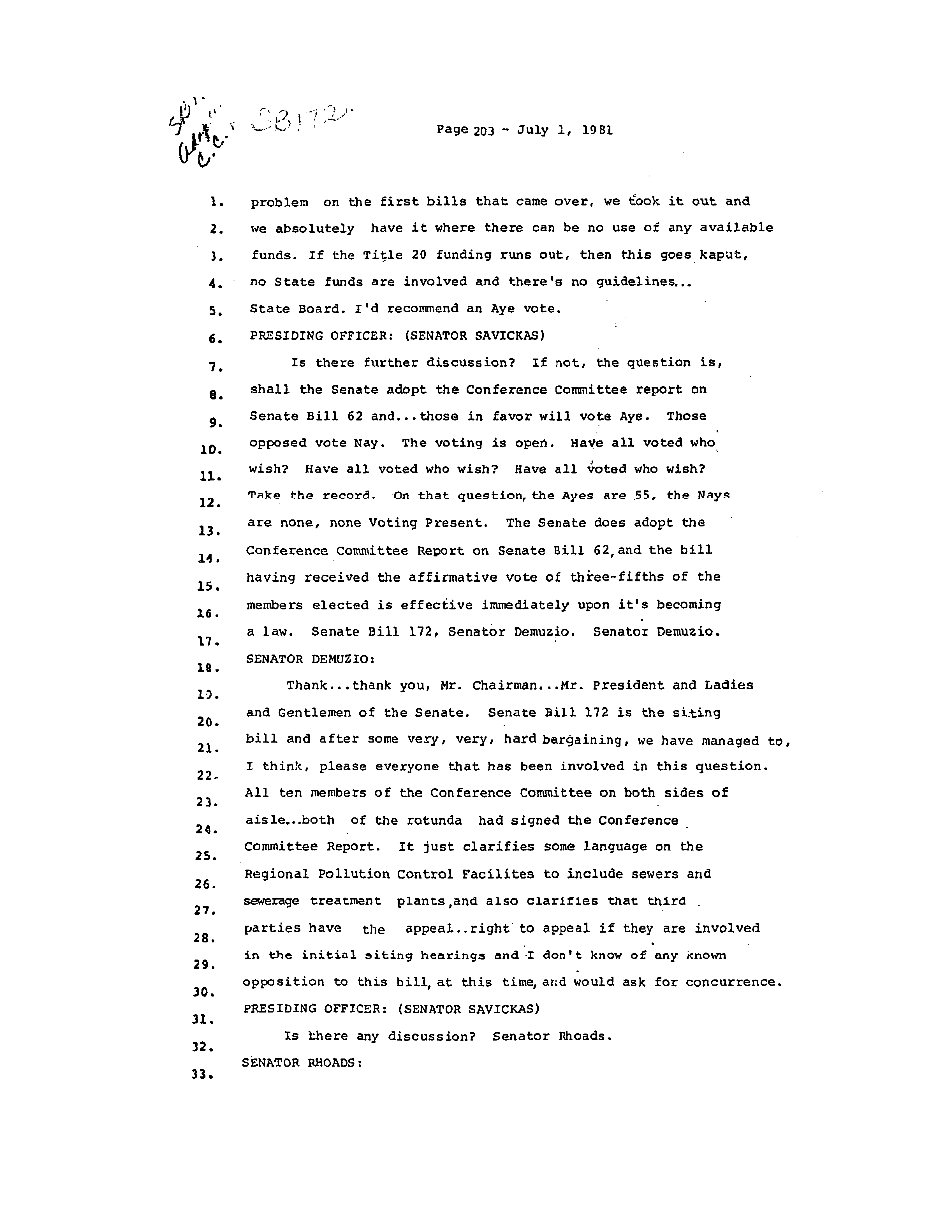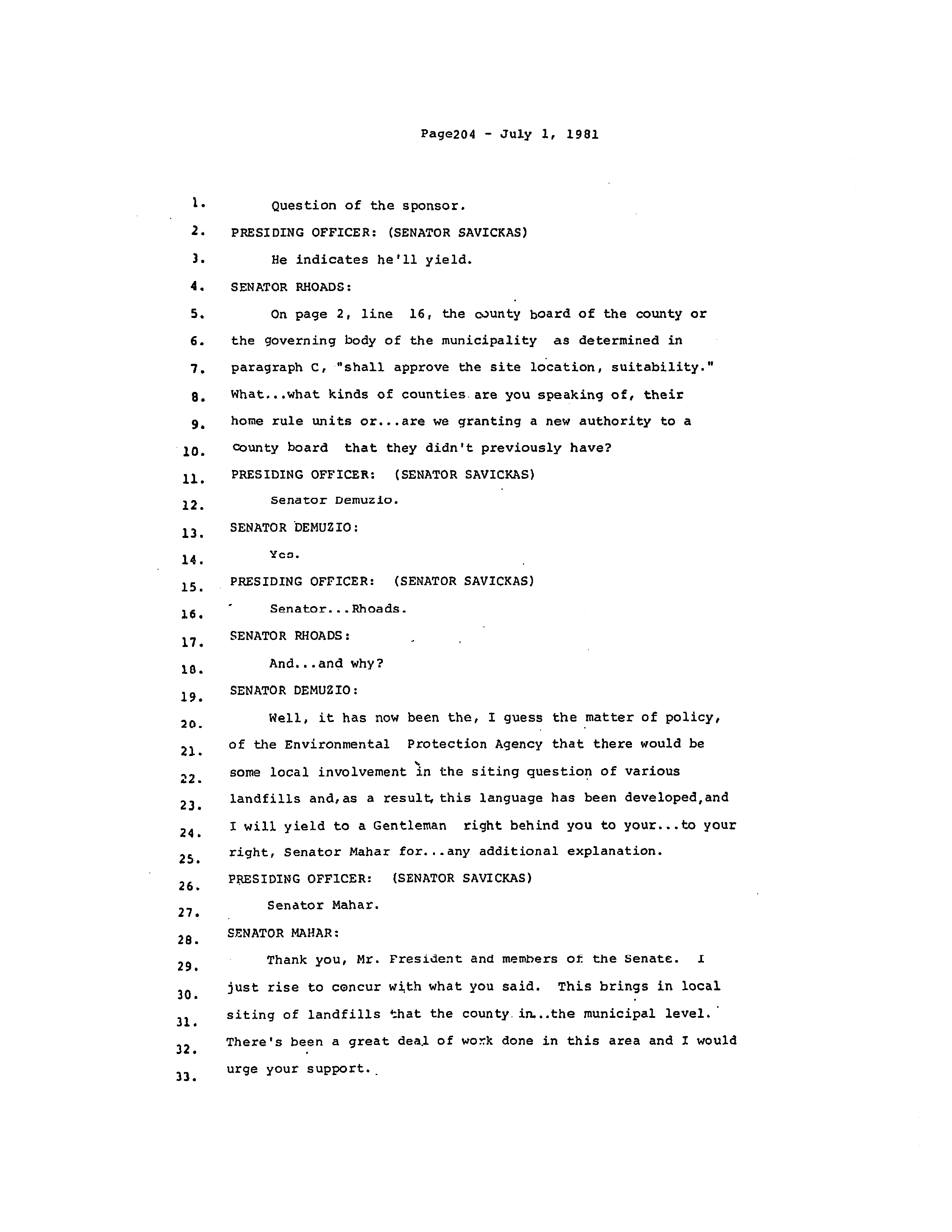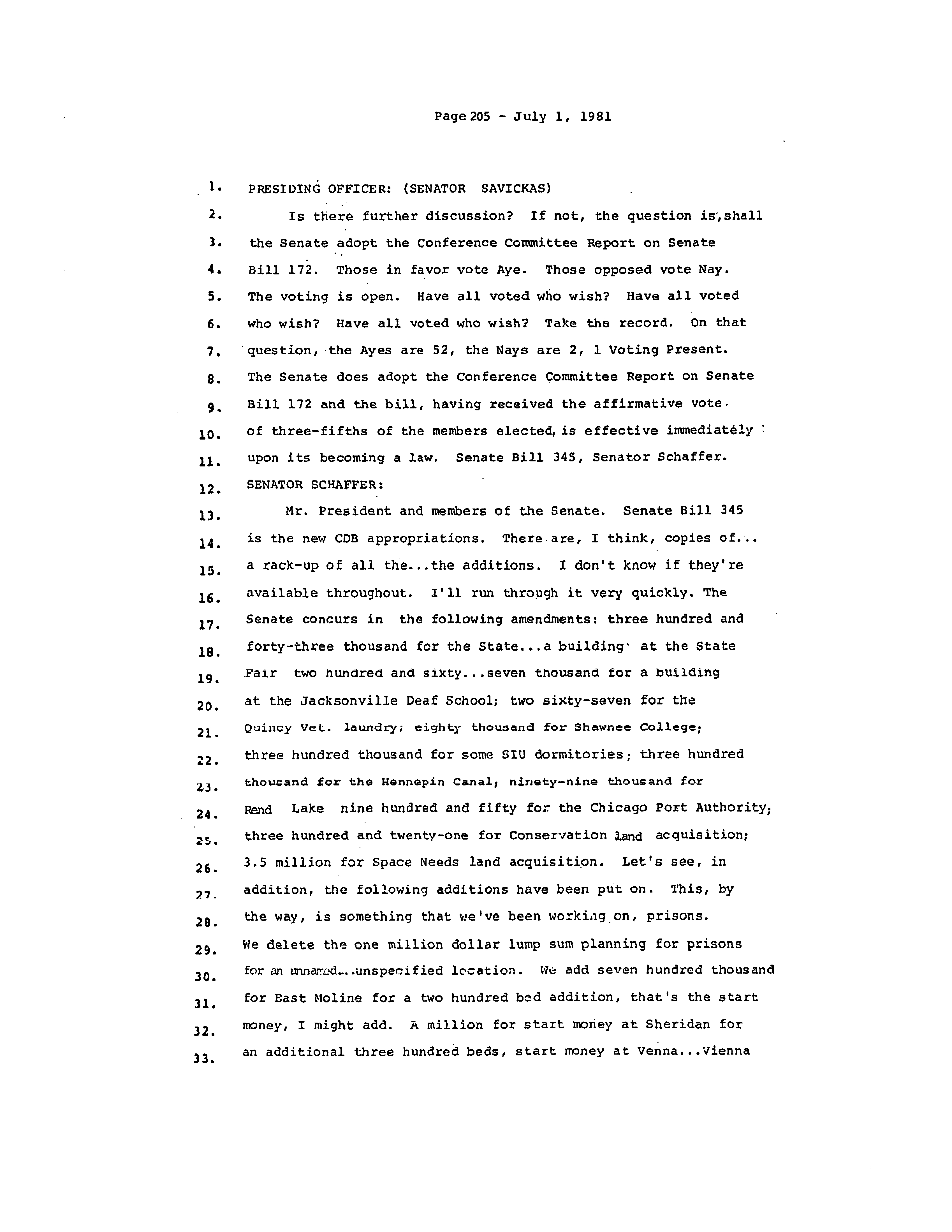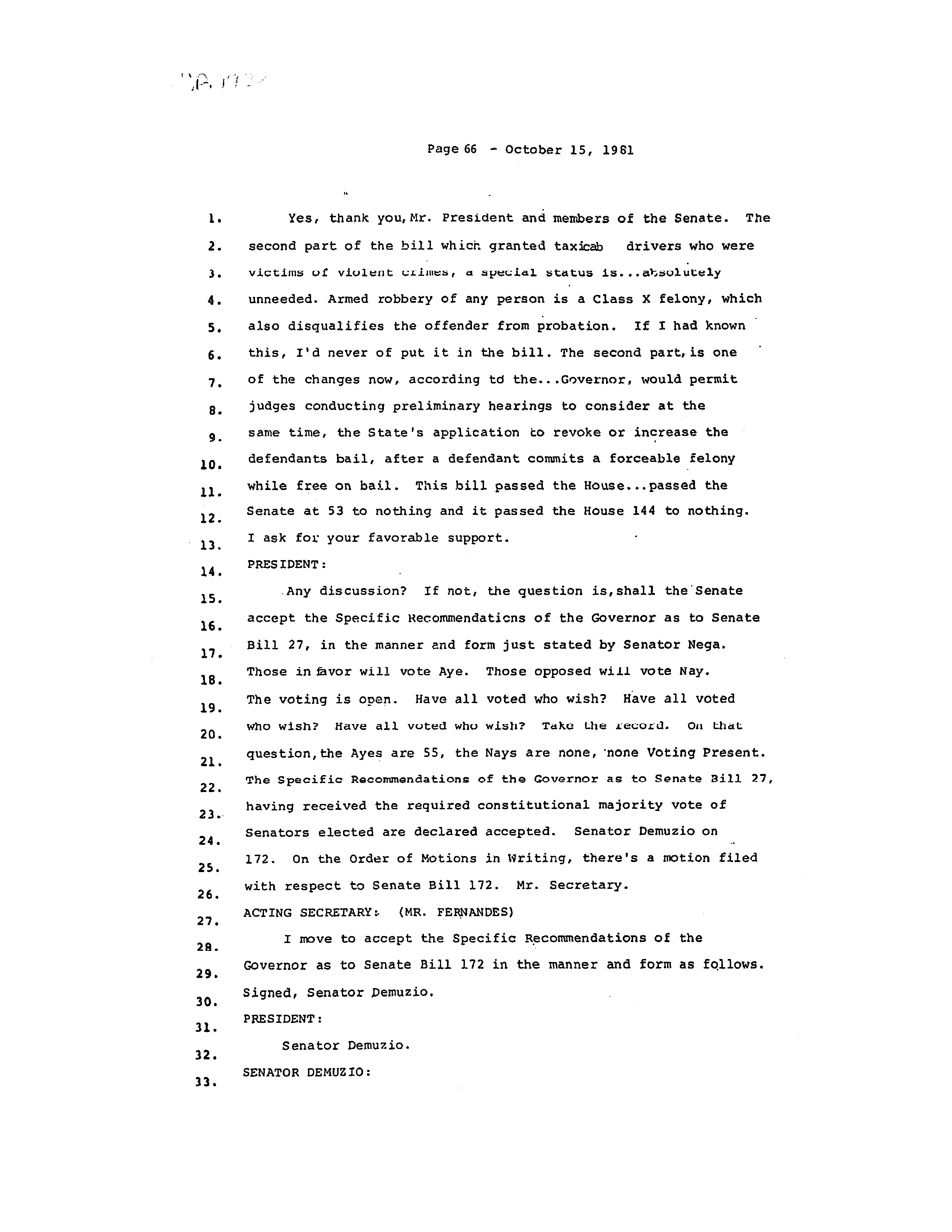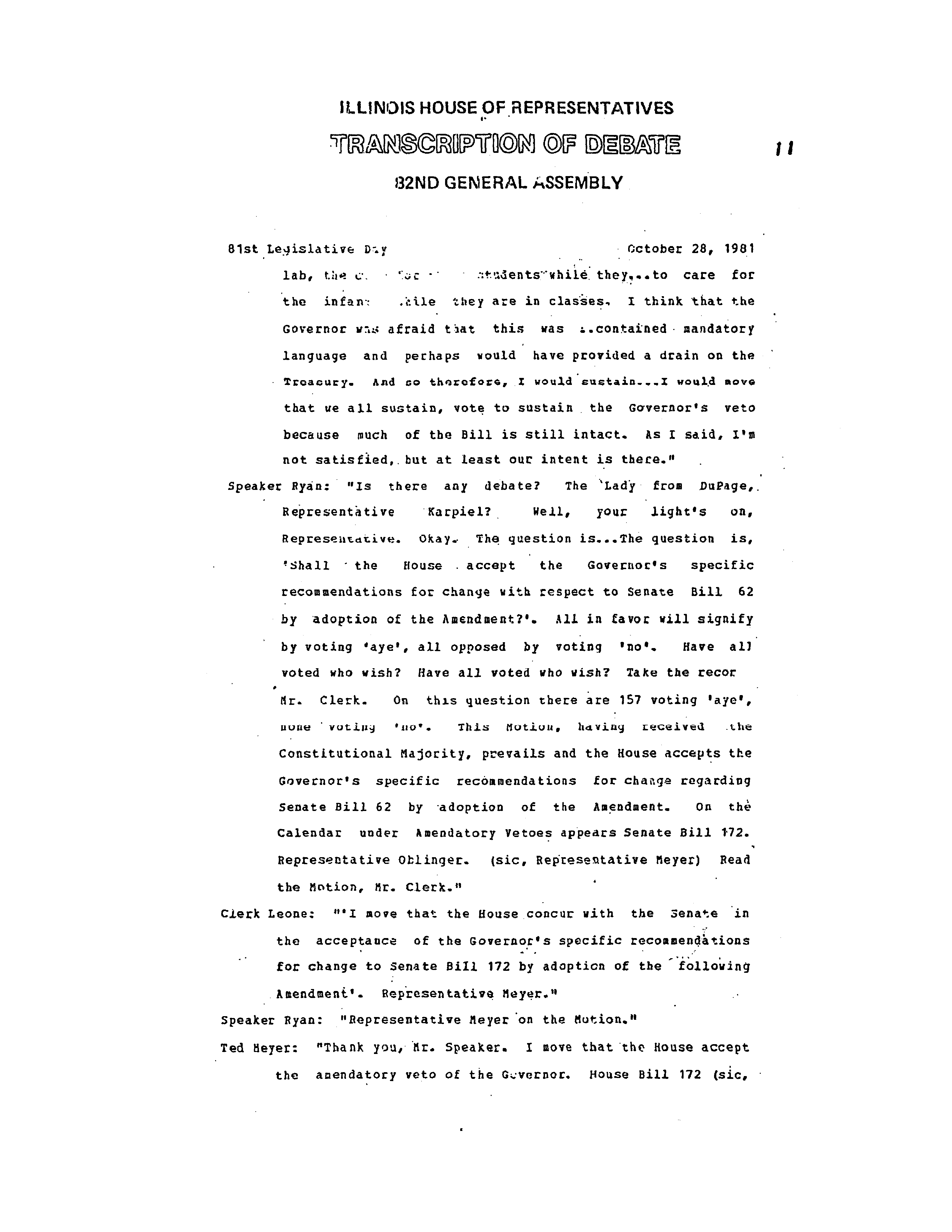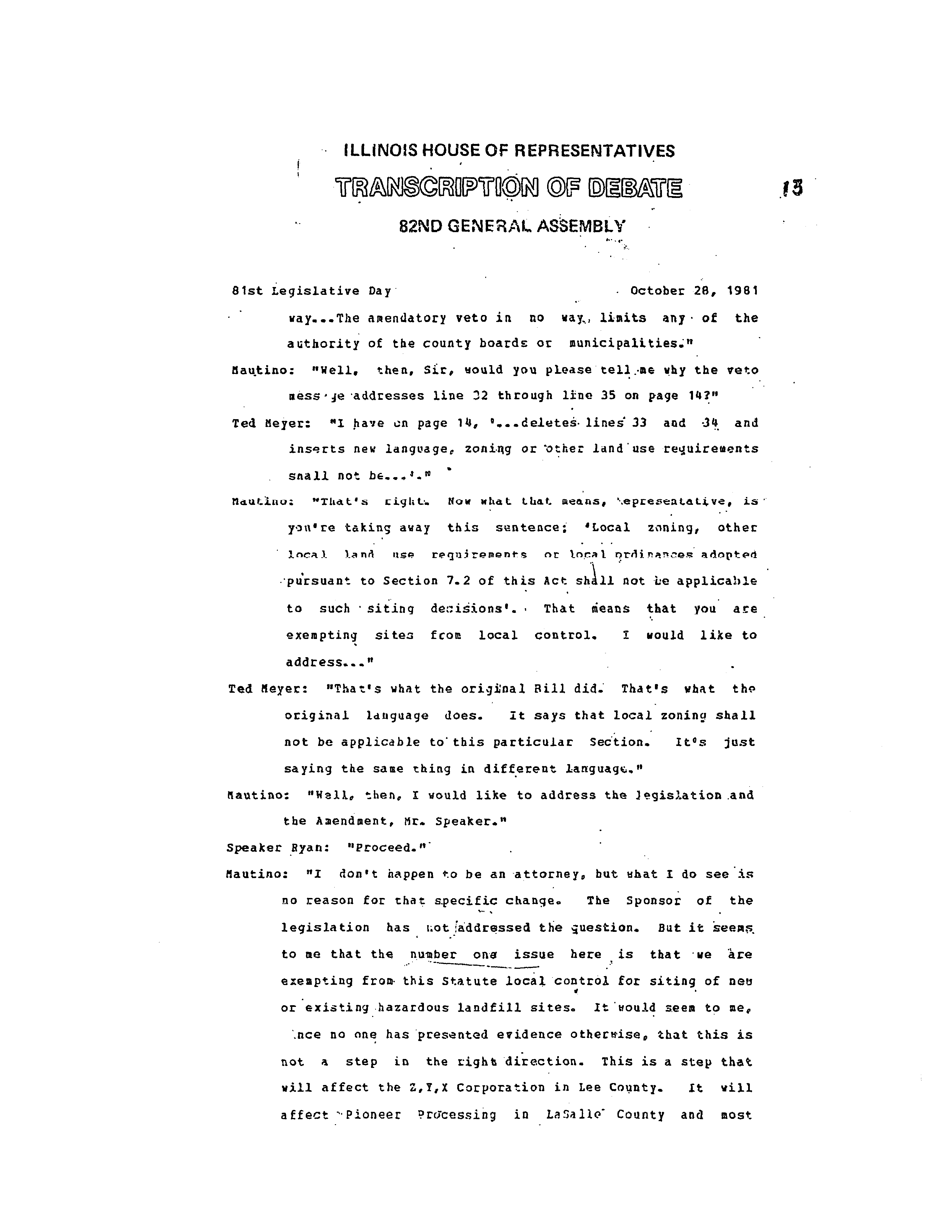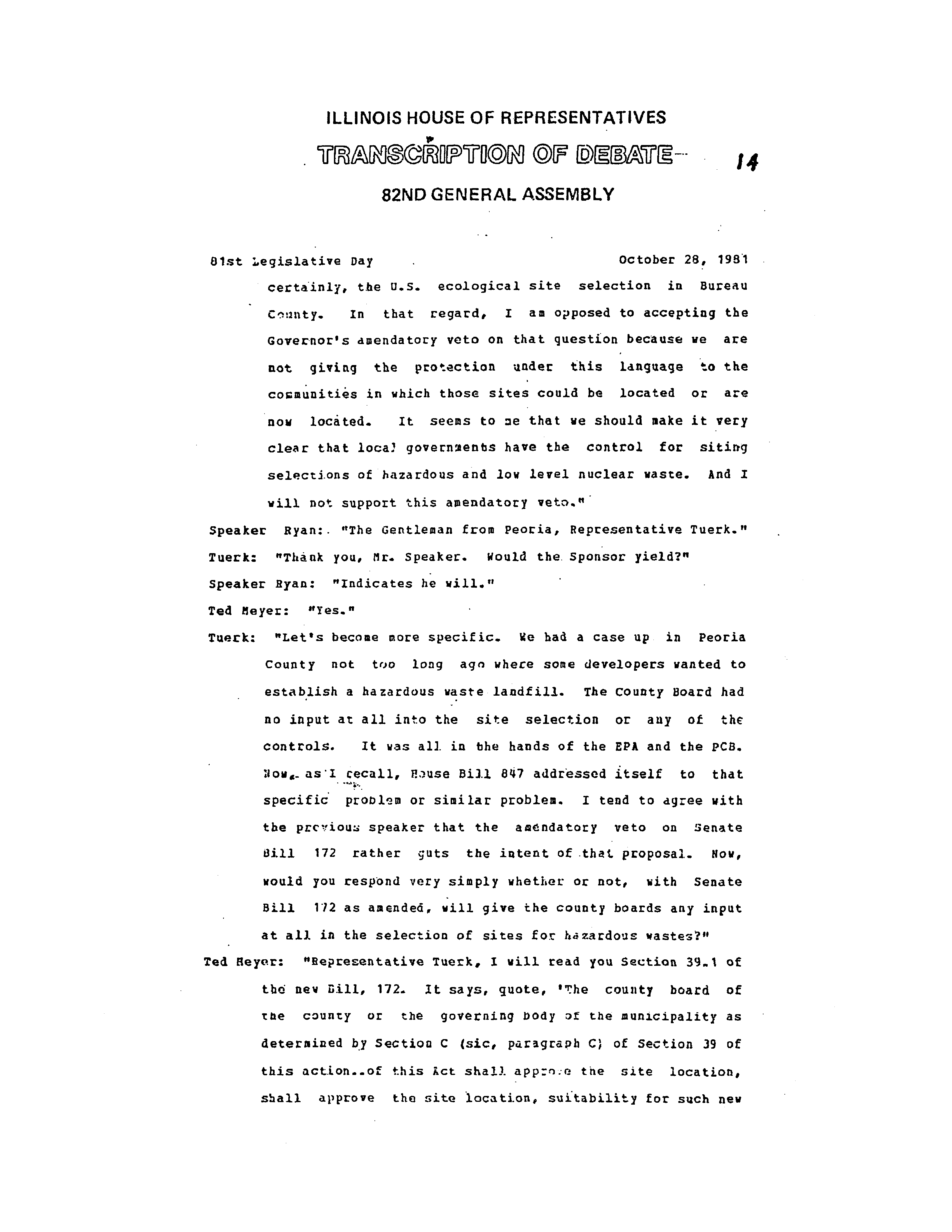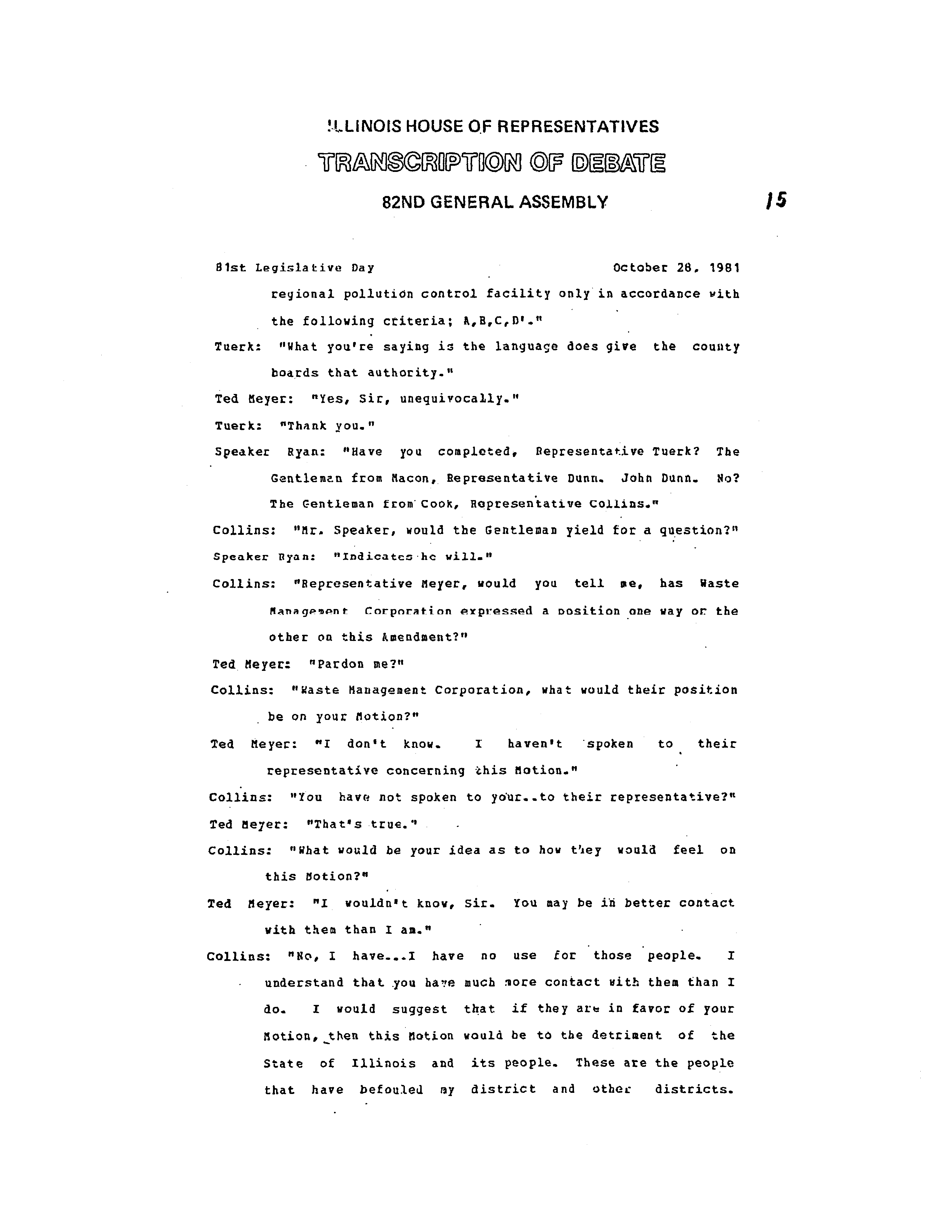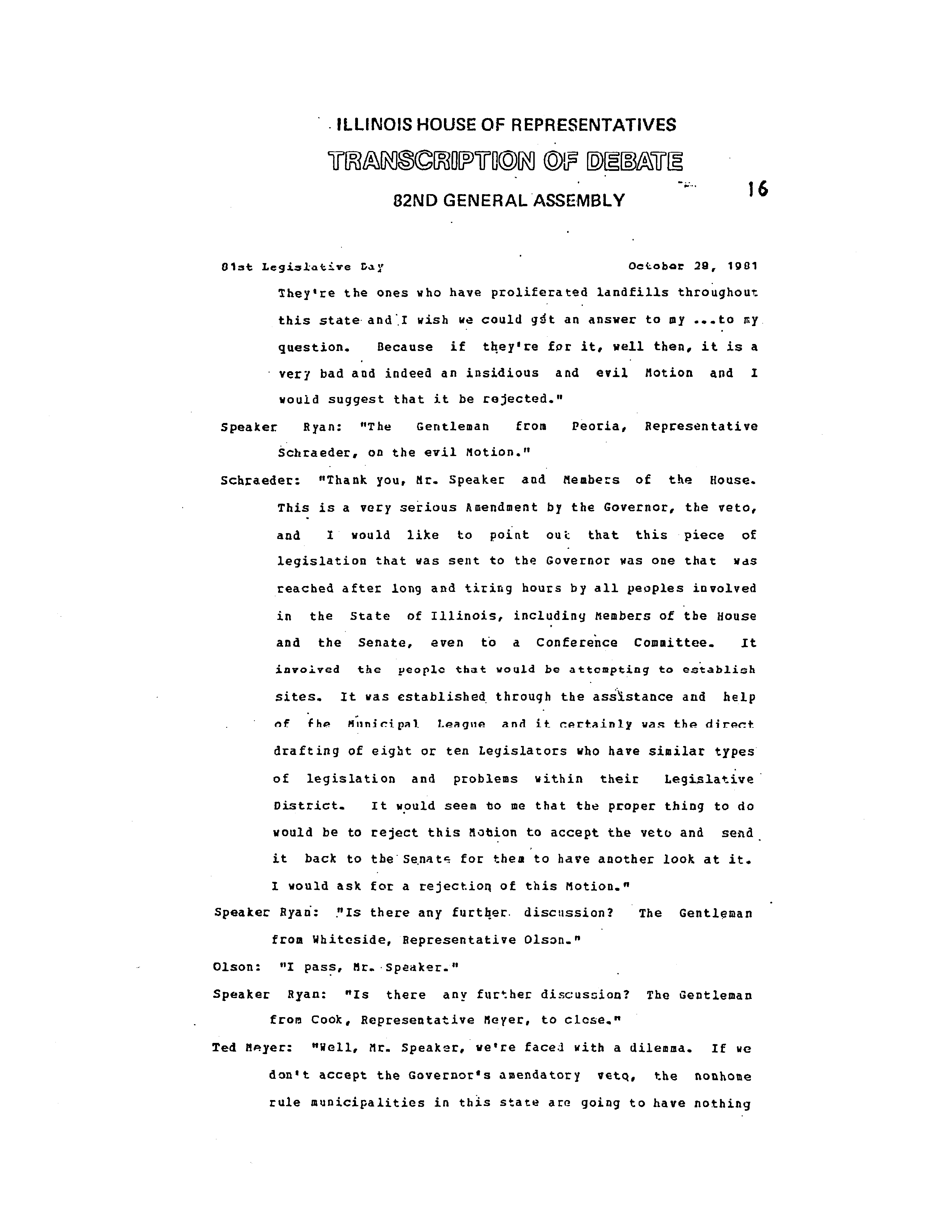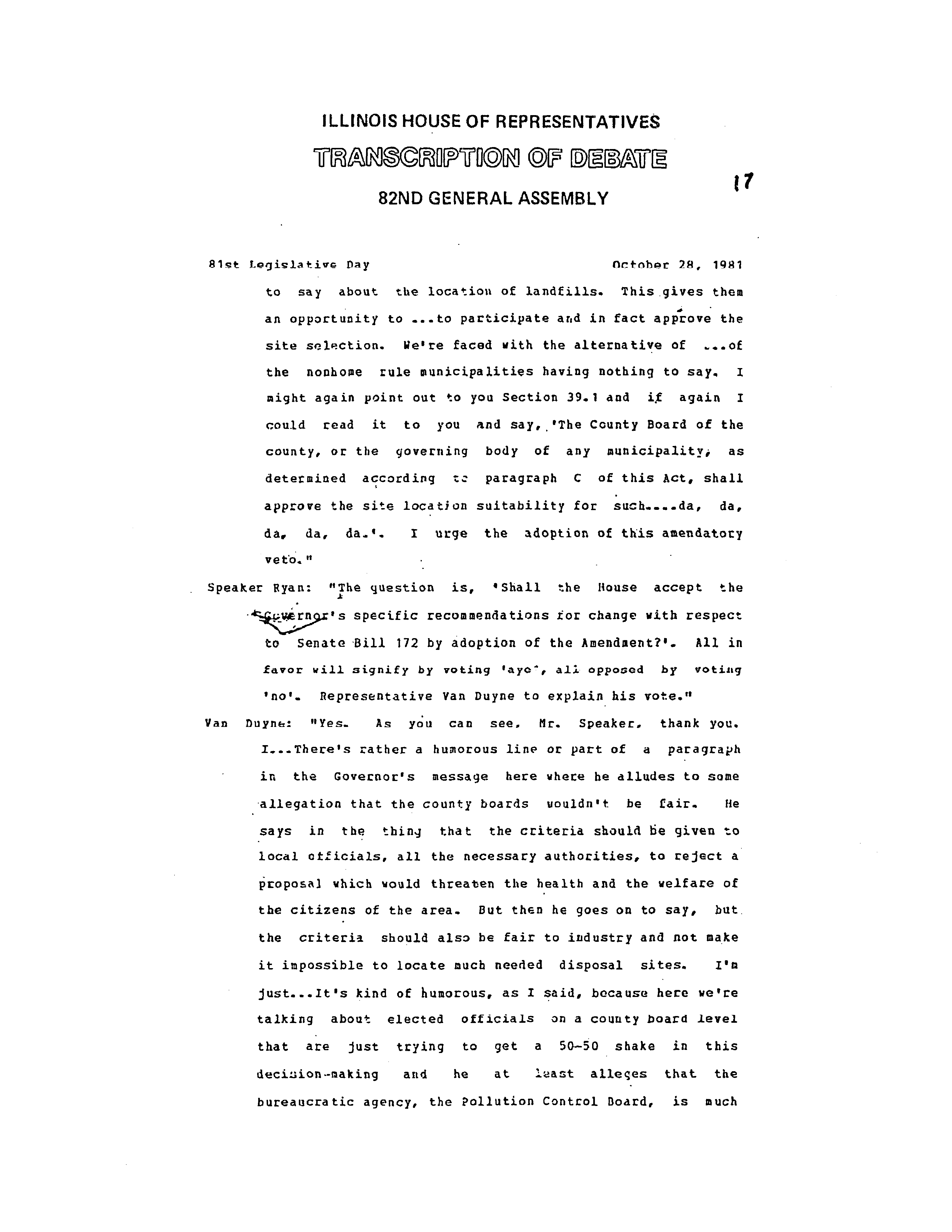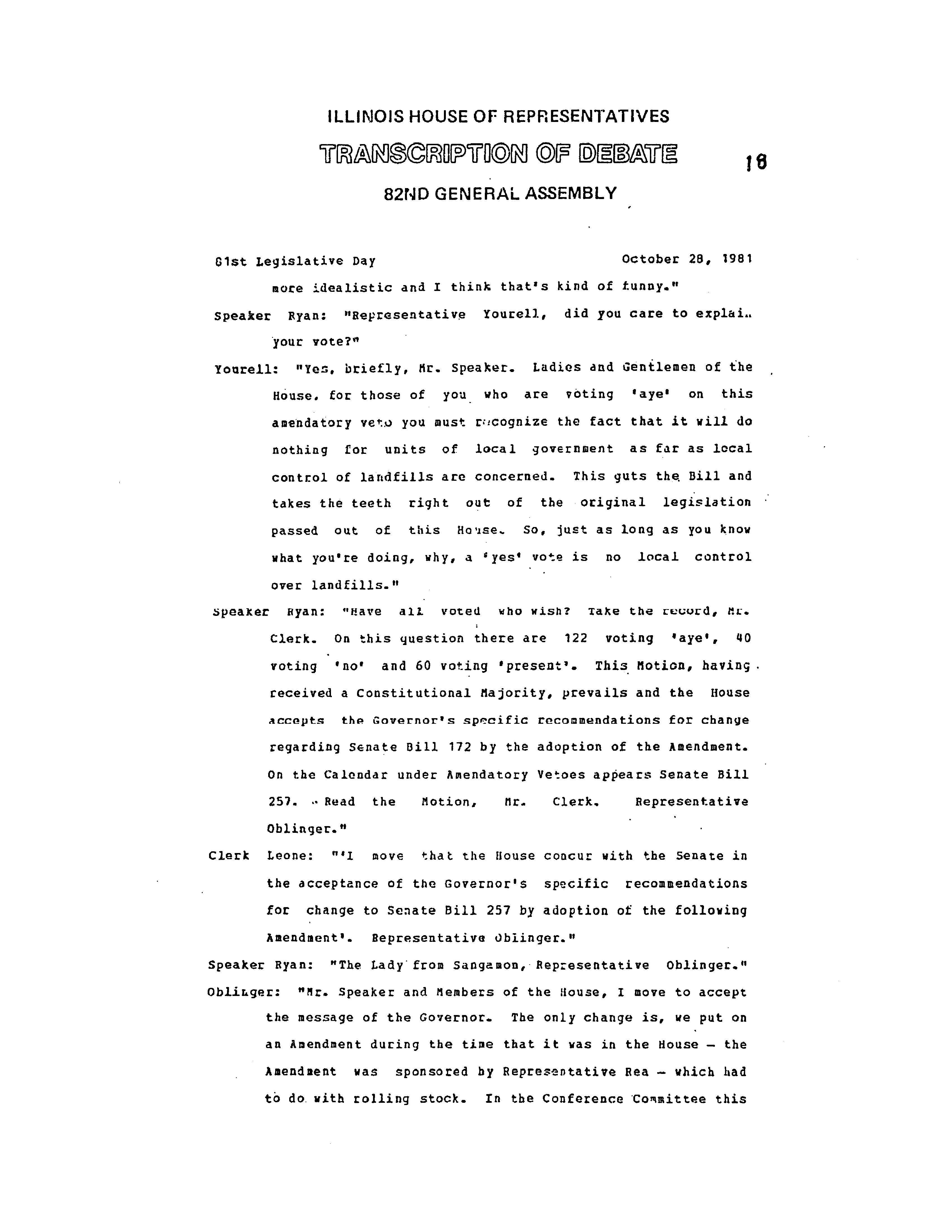ILLINOIS POLLUTION CONTROL BOARD
July 20, 1995
MEDICAL DISPOSAL SERVICES,
)
INC.,
Petitioner,
v.
)
PCB 95-75
PCB 95—76
ILLINOIS ENVIRONMENTAL
)
(Permit Appeals-Air, Land)
PROTECTION AGENCY,
)
(Consolidated)
Respondent.
DISSENTING OPINION
(by 3. Theodore Meyer):
I respectfully dissent from the majority order in this
matter because
I continue to believe that siting approvals are
freely transferable.
However, even if a new interpretation of
the local authority’s power is warranted,
based upon fundamental
fairness, Medical Disposal Services,
Inc.
(MDS)
in this case
deserved notice of this new interpretation.
Notice was not given
and MDS reasonably relied on the Illinois Environmental
Protection Agency
(Agency)’s actions,
including issuance of a
draft permit.
Therefore, the doctrine of equitable estoppel
prevents the Board from denying the transfer of the local siting
approval
to
MDS.
Ac ouch,
I would havo granted MDS’c motion for
reconsideration, reversed the Board’s May 4,
1995 order and
granted summary judgment in favor of MDS.
Based upon the plain language of Sections 39(c)and 39.2 of
the Illinois Environmental Act (Act),
local siting approval for a
pollution control facility is location-specific.
Section 39(c)
requires that a permit applicant submit proof of local siting
approval as part of the permit application process.
(415 ILCS
5/39(c)(l992).)
This requirement is mentioned four times and
each time it rcfers to “the location of the facility”.
(I~)
The language throughout section 39.2 also emphasizes the
location of a proposed facility.
In particular, subsection
(a)
lists
9 criteria which must be met in order for a local authority
to consider granting local siting.
(415 ILCS 5/39.2(a).)
The
criteria focuses on, among other factors, the location of the
proposed tacility, but do
jj.g~
mention the applicant.
(~~)
The
last paragraph of Section 39.2,
which allows a local authority to
consider the applicant’s history in the field of waste
management,
is not a criterion; rather,
it is
a discretionary
matter.
In other words,
a local siting authority cannot base its
decision solely on the applicant’s history.
Using the same logic
precludes a local authority from withdrawing a local siting
approval when the only change is the owner,
a non—criterion
factor.
2
Further proof that the last paragraph in Section 39.2(a)
carries less weight than the majority gives it can be found in
sections 39.2(m) and 39.2(f).
Subsection
(m)
states:
An applicant may not file a request for local siting
approval which is substantially the same as a request
which was disapproved pursuant to a finding against the
applicant under any of criteria
1 throucrh 9 of
subsection
(a)
of this Section within the preceding 2
years.
(415 ILCS 39.2(m) (emphasis added).)
If one owner is denied
siting approval, then within two years transfers the proposed
site to another,
that new owner is barred from applying for
siting approval because the only fact that changed is ownership,
a non-criterion.
Conversely,
if one owner obtained siting
approval because the location met all nine criteria,
a subsequent
owner of the same location should be able to retain siting
approval because none of the nine criteria had changed.
To hold
otherwise would render this subsection inconsistent with the rest
of Section 39.2.
The third paragraph in section 39.2(f)
states,
in part:
If a first development permit for a municipal waste
incineration facility expires.
.
.
any associated local
siting approval granted for the facility under this
Section may be used to fulfill the local siting
approval requirement upon application for a second
development permit for the same site, provided that the
proposal in the new application is materially the same,
with respect tn
the
criteria
in
subsectinn
(a).
(415 ILCS 39.2(f) (emphasis added).)
The last two lines of this
subsection indicate that the material issue in siting approval is
location because, again, the criteria in section 39.2(a)
involves
the requirements of the location, not the applicant.
Taken as a whole, Section 39.2 treats siting approval as
location—specific.
In the name of consistency, efficiency and
economics,
then, siting approval should be transferable at any
point after it is obtained.
A
close
look
at
the
transcripts
of
the
Illinois
legislature
during debate of Senate Bill 172, the bill involving pollution
control facilities, reveals
a legislative intent to consider
local siting approval to be location-specific.
The words
“location”
and “site” were mentioned 41 times during
deliberations, while “applicant”, or reference thereto, was only
mentioned twice.
(S.B.
172, 82nd Gen. Assembly,
3rd reading
(1981) (See Attachment A).)
Also, consider the following quote
from Representative Breslin:
“The things that the county board or the municipality
are to consider in making their judgement would be,
first of all, the public convenience at that location.
Secondly, that it is located so that the public health,
safety and welfare will be protected.
That
it will not
cause substantial injury to the property values in the
neighborhood and fourth, that the site is located
outside the boundary of the 100-year flood plain,
as
determined by the Illinois Department of
Transportation.
These are all issues that the local
units of government are familiar with.
They are not to
make technical decisions as to the suitability of the
site,
rather that power lies in the Environmental
Protection Agency.”
(Id.
at June
17,
1981, p.56.)
Nowhere is there mention of the
site applicant,
or its history.
Granted, the last paragraph of
Section 39.2(a)
was added after this discourse, but it was not
made part of the nine criteria.
I therefore maintain my belief
that it
was
the legislature’s intent to consider siting approval
to be location-specific.
In addition, having been Chairman of the House of
Representatives’ Environmental Committee during that time, and
Chairman of the Conference Committee which created SB 172,
I know
that local siting approval was considered location-specific by
the framers of the bill.
Six of the criteria in Section 39.2(a)
were adopted directly from Chicago’s zoning ordinances.
Zoning
ordinances are premised on real property law which abhors
restraints on alienation.
Thus,
zoning permits run with the land
and are transferrable upon issuance.
Reliance on these premises
is positive proof that local
siting approval
is location—
specific, runs with the land and is therefore transferable.
In further support of my position,
I would again point to
Christian County Landfill,
Inc.
v. Christian County Board, PCB
No. 89—92 October 18, 1989 Board Order.
In unequivocal terms the
Board
stated that “nowhere
in the criteria is there any
reference to future transfer of ownership of the proposed site.
(Id.
at
14.)
The Board then construed this silence “as
indicative of an intent by the General Assembly to limit the
authority of a local unit of government only to reviewing the
merits of the initial application.”
(~(einphasisadded).)
Once
that process
is complete, the local government’s authority “is
exhausted” and the “operational aspects” of the facility will be
reviewed by the Agency to assure compliance with the Act and
Board regulations.
(~L)
Transfer of ownership of a facility is
an operational aspect and thus an Agency concern.
(Landfill,
Inc.
V. Pollution Control Board,
74 I11.2d
541,
387
N.E.2d
258,
264
(Ill.
1979).)
To hold otherwise,
as the Board anticipated,
would “create havoc
in the state’s system of waste disposal.”
(PCB No.
89—92, October 18,
1989 Board Order at
15.)
4
Another concern worth reiterating involves the inevitable
digression from the well—established principle that an
interpretation of law should not lead to illogical or absurd
results.
(Croissant v. Joliet Park District,
141 Ill.2d 449,
566
N.E.2d 248
(1990), Mulligan v. Joliet Regional Park District,
123
Ill. App.2d 303,
527 N.E.2d 1264
(1988).)
In the the four months
since debate began in this appeal, nine possible scenarios have
been proffered as examples of illogical or absurd results from
the majority opinion
in
this matter.
(See MDS’s Memorandum in
Support of Motion for Summary Judgment, p.13; MDS’s Motion for
Reconsideration, p.15-16; Industrial Fuels and Resources/
Illinois, Inc.’s Memorandum of Law in Support of
Petitioner’s
Motion for Reconsideration, p.10; and, Illinois Chapter of the
National Solid Wastes Management Association’s Brief as
Araicus
Curiae,
p.17.)
Perhaps the most disturbing example of illogical results is
the effect on financial transactions in the field of pollution
control facility development.
As I mentioned in my first
dissent,
if siting approval can be revoked prior to the issuance
of development permits, a financial institution will perceive any
investment in the facility at that point as purely speculative.
If financing becomes more difficult, the cost of building
pollution control facilities rises, as will the cost of disposing
those materials accepted by a given facility.
The rise in
disposal costs will be ultimately born by the Illinois taxpayer
without benefit of an additionally-protected environment.
This
result contradicts the intent of the Act, especially in light of
the fact that there are other safeguards in place to protect both
the siting approval decision of the local body of government, and
the environment.
First, responsibility for protecting that decision lies with
the Agency through investigation, enforcement and revocation of
permits.
Section 39(i) creates the Agency’s statutory right “to
deny permits based on the operator’s prior history of violations
established through a record of enforcement actions.”
(~$~
Watts,
Inc.
v. Illinois Environmental Protection Agency, PCB 92-
54 at
9 (October 29,
1992)
quoting
Waste Management v.
IEPA, PCB
84—45, 84—61 and 84—68
(consolidated)
at 38).)
Even so,
it is
important in the context of this case to note that alleged prior
conduct cannot be relied upon solely to deny a permit even within
the context of Section 39(i).
(ESG Watts,
Inc. v.
Illinois
Environmental Protection Agency, PCB 92-54 at
9 (October 29,
1992)
citing
Martell
v. Mauzy,
511 F.Supp.
729,
738—43
(N.D Ill.
1981).
Second, facility owners usually have to post
a bond as
insurance
for clean—up costs
from possible accidents at the site.
A bond issuer often requires details of the owner’s experience
in
the field.
Posting a bond, therefore,
is yet another safeguard
in protecting local citizens and the environment.
The City of
5
Harvey’s
concern
regarding a lack of opportunity to protect its
decision and examine a facility operator is unfounded.
Even if I were inclined to agree with the majority opinion,
that is, hold that siting approval is applicant-specific and
thererore non—transrerable prior to obtaining permits from the
Agency,
I would still dissent based on the well-established
principle that an administrative agency cannot change an
interpretation of law
without notice to those parties that will
be affected by that change.
“~Adininistrative
bodies are bound
by prior custom and practice in interpreting their rules and may
not arbitrarily disregard them.”
(Alton Packaging c~orp.v.
Pollution Control Board,
145 Iii. App.
3d 1090,
497 N.E.2d 864
(5th Dist.
1986).)
This policy
is enforced to achieve the Act’s
overall objective of uniform results where there has been no
change in applicable legislation.
Thus,
a change in
transferability requires legislative action, especially since
there are no standards regarding which transferrees can keep
siting approval and which ones have
to
reapply.
In the case at bar, there is evidence in the record that the
Agency has a1nw~
transfers of local siting approval prior to
the issuance of permits.
(See MDS’s petition at Exhibit
P.)1
In
fact, by its own admission to MDS, the Agency stated in a January
10, 1994 letter:
“Consistent with previous interpretations in similar
situations, the Agency policy remains that siting
approval
is location specific and remains with the land
upon sale of an approved parcel.”
(.~ee
Pet.
at Exhibit C.)
Therefore,
the Agency ic bound by those
prior practices to interpret the present case in the same manner.
To hold otherwise subjects MDS to an arbitrary interpretation of
section 39, and creates an inconsistent result.
As a final note,
I find
it inherently unfair that the
majority opinion did not choose to apply the doctrine of
equitable estoppel in this case.
Six elements must be shown in
order for the doctrine of equitable estoppel to apply:
(1) Words
or conduct by the party against whom the estoppel is alleged
constituting either a misrepresentation or concealment of
material facts;
(2) knowledge on the part of the party against
whom the estoppel is alleged that representations made were
untrue;
(3) the party claiming the benefit of an estoppel must
not have known the representations to be false either at the time
they were made or at the time they were acted upon;
(4) the party
estopped must either intend or expect that his conduct or
‘NDS’s petition is hereinafter referred to as “Pet. at.”.
6
representations will be acted upon by the party asserting the
estoppel;
(5) the party seeking the estoppel must have relied or
acted upon the representations; and,
(6) the party claiming the
benefit of the estoppel must be in a position of prejudice if the
party against whom the estoppel
is alleged is permitted to deny
the truth ot the representations made.
(City or Mendota
v.
Pollution Control Board,
112 Ill. Dec.
752,
756
(1987).)
Although the Board has rarely applied the doctrine of
estoppel,
in those cases where we have applied it, the Agency was
found to have affirmatively misled a party and then sought
enforcement against that party for acting on the Agency’s
recommendation.
(People of the State of Illinois v.
Freedom Oil
Company, PCB
93-59,
(May
5,
1994)
at 5.)
(See
also
IEPA
V.
Jack
Wright, AC 89—227 (August 30, 1990),
In the Matter of: Pielet
Brothers’ Trading,
Inc.,
AC 88—51
(July 13,
1989).)
In the case at bar, the Agency communicated to MDS by letter
that its previous practice was to allow transfer of siting
approval to a new owner prior to issuance of any permits for the
property.
(Pet. at Exhibit C.)
MDS spent nine months and
considerable resourcss preparing for its facility, and even
received a draft permit from the Agency to begin development.
(Pet.
at
Exhibit D.)
By a letter dated October 14,
1994, the
Attorney General notified the Agency that it had misled MDS in
its interpretation of siting approval transfers.
(Pet. at
Exhibit G.)
The Agency thereafter began proceedings to remove
siting approval status from MDS’s property.
This is a classic scenario for which equitable estoppel
applies.
To deny MDS this protection allows the Agency, and the
City of Harveyf
to use denial of transferability of siting
approval as an enforcement tool for alleged violations of the
Act,
a clearly forbidden activity.
(See
Centralia Environmental
Services,
Inc.
v. Illinois Environmental Protection Agency, PCB
89-170 at
13
(October 25,
1990),
citing
Waste Management.
Inc.
V.
IEPA,
(consolidated)
at 36—38; Frink’s Industrial Waste,
Inc.
v.
IEPA, PCB 83—10 at 13
(October
1,
1984).)
At the very least,
the Board should conclude that the two-year siting approval
period is tolled as of September
12,
1994, the date on which MDS
first learned the Attorney General did not find a grant of local
siting approval by the City of Harvey.
(Pet.
at Exhibit E.)
For these reasons,
I respectfully dissent.
J(~heodoreMeyer
Board Member
I, Dorothy M.
Gunn,
Clerk of the Illinois Pollution Control
Board, hereby certify that tJi~above dissenting opinion was filed
on the
~1’
day of
_______________,
1995.
Dorothy N.
Gu~4i, C1e~1c
Illinois Pol~itionControl Board
Page 169
—
May 19, 1981
L.
senate Bill 171 having received the required constitutional
2.
majority is declared passed.
Senate Bill 172, Senator Demuzio.
3•
Read the bill, Mr.
Secretary, please.
4.
SECRETARY:
s.
Senate Bill 172.
6.
(Secretary reads title of bill)
3rd readingof the bill.
PRESIIThNG OFHCER:
(SENATOR BRUCE)
9.
Senator Dernu:io.
SENATOR DEMUZIO:
11.
Thank you,.. .very much, Mr. President and Ladies and Gentle—
2
men oE the Senate.
Senate
Bill 172
hears the name of
several
13
individuals on both sides of the aisle.
‘It
was agreed to in
14.
committee that all of the landfill bills would be put into a
.into one bill.and,
in fact, they are...all repose in Senate Bill
16.
172 at the currer~ttime.
To be brief and..,then ask,,.or be
17
able to answer any,guestions, let
me just say tflt the thrust
of this bill indicates that there
are
no
permits
that
will
be
19
.
.
.
no
permits
for
the
development
or construction of any pol—
lution control facilities will be granted by the agency unless
21
the applicant submits proof
to the agency that the location
22
of
the
facility
has
been
approved
by
the
county
board
of
the
23.
county
or
the
governing
board
of
a
muhicipality in which the
24
facility is
to
be
located.
Notice
provisions
to
members
25
of the
Illinois General Assembly are still embedded inthis
26
bill as.. .at the request
of
Senator
Mahar and...I would ask
27
for support of the Senate today and...stancl ready to answer
28
any questions that the membership may have.
29.
PRESIDING OFFICER:
(SENATOR BRUCE)
30
Is there discussion?
Is there discussion?
Senator
31.
Nimrod.
32.
SENATOR NIMROD:
3
Yeah.
A.. .a question of the sponsor,
Mr. President.
MaN2k
~SE1JT~
R-TTPCJ-4(YEPJT
l
ii
Page 170— May
19,
1981
1.
PRESIDING OFFICER:
(SENATOR BRUCE)
2.
Indicates he will yield.
Senator Nimrod.
1.
SENATOR NIMROD:
4.
senator,
can you tell me
what the opposition here seems
5.
to be from even EPA.
•
.of a company such as Caterpillar, which•
6.
I
do not consider a
polluter,..
.waste
management groups, the Illinois
7.
Manufacturers’
.~ssociation,...and then there is a statement
here from a professional engineer?
~Whatts
their opposition
to
this
particular
bill if it seems to be so good?
10.
PRESIDING OFFICER:
(SENATOR BRUCE)
11
Senator Demuzio.
12.
SENATOR DEMUZIO:
13.
Well, Senator,
nc one has contacted me in relationship to
14.
their opposition to this bill.
It is my understanding that
the EPA
is
in
support
of such a measure and.. .perhaps you
16.
might want to.. .look
to
some of yourcolleagues on your side
17
of the aisle and.. and.. .and ask them.
But as of this moment,
18
I have not had any communications from any of those to which
19.
you
refer
in
opposition
to
this
legislation.
20.
PRESIDING
OFFICER:
(SENATOR BRUCE)
21.
Further
questions,
Senator
Nimrod?
22
SENATOR
NIMROD:
23.
Yeah.
I understand that they were...opposed to
the
bill
24.
before
it was amended,
but there’s been no comment of whether
25
or not they’re opposed to it since then and.
•
.1 would
assume
26
then that there’s still opposition...it seems a bill like this
27
r
of
this
magnittxIe should
not
be
hanging
this way indicating these
28
..
.this kind of opposition to the bill.
29
PRESIDING OFFICER:
(SENATOR BRUCE)
30
Senator Mahar.
SENATOR
MAJIAR:
32
Thank you, Mr. President and members of the Senate.
I rise
in support of this legislation as one who has worked
for. some
Page
171
—
May 19,
1983.
1.
period of time trying to get some local control in landfill
2.
siting.
I think some of the opposition that may be...e’4—
3.
dence...of the previous speaker is some that...might have been
4,
before the Supreme Court
made
the decision, which said
that...
~,
in home rule communities, home rule counties and.,.and
6.
municipalities that there is concurrent jurisdiction in the
~
siting
of
landfills.
This bill,
I think,
is a composite
8.
of the thinking of several members of the General Assembly.
It is a result of a great deal of discussion between the EPA,
between the.. .municipalities ‘and between the Municipal League and
-
.
.
.1 think we’ve arrived at a conclusion that we’ve been long
12.
seeking and that we should get some support and
I know that
13.
many towns, particularly in...
my area and throughout the
14.
State of Illinois, are going to be very much concerned about
~
having this type of legislation on the books.
I urge your
16.
support.
17.
PRESIDING OFFICER:
(SENATOR BRUCE)
18.
Senator
Berning.
19.
SENATOR
BERNING:
Just
one
question
of
the
sponsor.
Senator,
what
would
be
21.
the
situation with a recalcitrant county board’s continual re—
22
fusal to approve a site?
The disposition then of waste becomes
23.
something
of
a problem.
Is there any kind of. ..forced arbi—
24.
tration or some sbrt of penalty that would...mandate a de—
25.
cision.
.
.or...underwriting of a decision to move the waste
26
to a neighboring county?
Bow would you.. .address that?
27.
PRESIDING OFFICER:
(SENATOR BRUCE)
2~8
Senator
Demuzio.
29.
SENATOR
DEMUZIO:
30
On page’lO of the amendment it indicates that...if there
31.
is no final action by the county
board or of the municipality
2
in
which
the
site is to be located...then after one liindred
13.
and twenty days the filing of the request for the site approval
Page 172
—
May
19, 1951
t.
that the application is then deemed to be considered...approved.
2.
PRESIDING OFFICER:
(SENATOR BRUCE~
3.
.
Senator Berning.
4
SENATOR
BERNING:
Thank
you.
I
did
not
have
the
ameidment.
I
didn’t
realize
6.
there was anything more than the...original
two
pages of
the.
bill.
8
PRESIDING OFFICER:
(SENATOR BRUCE)
9
Senator DeAngelis.
May we have some order please, Ladies
10.
and Gentlemen?
Senator DeAngelis.
1
SENATOR DEANGELIS:
12.
Thank you,
Mr. President.
A question of the sponsor please.
13.
PRESIDING OFFICER:
(SENATOR BRUCE)
14
Indicates he will yield.’
Senator DeAngelis.
SENATOR
DEANQELIS:
15
Senator Demuzio, this is aw “or” situation,
it is not an ‘and1
situation
•
Correct?
17.
18
PRESIDING OFFICER:
(SENATOR BRUCE)
Senator Demuzio.
43.
SENATOR DEMUZIO:
20.
.
—
That is correct.
21.
SENATOR DEANGELIS:
22.
23.
Well;...where is that different than from today?
Do not
24
the landfills require some kind of permit, whether from the
25
municipality or from the..
•
ocal governing
body?
PRESIDING
OrnCErt:
(SENATOR
BRUCE)
26.
Senator Deniuzio.
27.
SENATOR
DEMUZIO:
28.
29
Well, the.
..
rule
municipalities ~.ce’rcise
concurrent
30
jurisdiction, whereby non-home rule municipalities do not.
.By
31
.
.
.by the Supreme Court decision.
PRESIDING OFFICER:
(SENATOR BRUCE)
32.
Senator DeAngetis.
33.
Page 173
—
May 19, 1981
1.
SENATOR
DEANGELIS:
2.
well, maybe Itm a little! confusod, but...home...non—home
3,
rule units have zoning permits also,
4
PRESIDING OFFICER:
(SENATOR BRUCE)
May we have some order?1
senatd~Demuzio.
6.
SENATOR DEMUSIO;
But local
zoning does riot apply.
8.
PRESIDING
OFFICER,
csENAToR~nUcE)
9
Senator DeAngelis.
10.
SENATOR DEANGELISt
11
well,
I’m just reading through this amendm~nt,but...it
12
states in there specifically, somewhere in this amendment,
that
13
they have to have zoning approval by either the municipal
14
government or the county government.
PRESIDING
OFFICER:
(SENATOR
BRUCE)
Alright.
Further discussion?
Senator Geo—Karis.
16.
SENATOR
GEO—KARIS:
1’7.
Mr.
President
and
Ladies
and
Gentlemen
of
the
Senate,
there
18.
19
was
a
case
that
was.
•
,decided
by
a~.divided opinion
Worth....
20
the
City
of
Worth
versus
Carlson.
And
in
that
ca~e,
by
just
21
one
vote
more
in the Supreme Court
it
said
that
the
EPA could
22.
get the.. .grant the permit even
if
the
local
authorities
did
23.
not grant
it.
This happened in my area, where..,a very nice
residentLil area was used for a waste landfill.
It’s deplor—
24.
25
able, iL’s
a mess and
they’ve taken
waste
from,out
of State,
26
I
think
this
is a very
good
bill and
.1 urge your faw~rab1esupport.
PRESIDING
OFFICER:
(SENATOR
BRUCE)
27.
Further discussion?
Senator Jerome JoycW
28.
.
F
SENATOR JEROME JOYCE:
29.
Thank you, Mr. Presiden’.
As chairman
of
tWe
committee
30.
that this bill went through,
I’d like to cçthmend the...the
sponsors of the various bills
in the committee...for their
32.
cooperation •in...in developing this one comprehensive bill
iage 174
—
May 19,
1983.
1.
‘thp~t is sorely needed in
the State of Illinois.
I think
2.
tHey.. .all of them are to be commended for working together
~•
to..
•
to put out this one effort and I would urge a f~’iorable
vote.
PRE,SIDING OFFICER:
(SEN?;TOR BRUCE)
6.
Further discussion?
Senator DeAngelis, did you have
•
your question answered?
Do you have further’ questions?
8.
Alriyht.
rurther discussion?
Senator Demuzio may close.
SENATOR DEMWtIO:
10
Well; thank
you,
Mr..
,President
and
Ladies
and Gentlarnen
of the Senate.
I think Senator Joyce put it very
wall
in his
snmmatinn of the efforts of everyono that was involved 3~nde—
12.
13
veloping
this
legislation.
Obviously, perhaps
some more...
refinement needs to be made.
If...if it needs to be made,
14.
let’s do it in
the House and ask for your favorable support
16
today.
‘thank
you.
PRESIDING OFFICER:
(SENATOR BRUCE)
17.
18
The question is,
shall Senate Bill 172 pass?
Those in
19
favor vote Aye.
Those opposed vote Nay.
The voting is open.
Have all voted who wish?
Have all voted who wi::h?
Take the
20.
21
record.
On that question, the Ayes are
55, the Nays are none,
22
none Voting Present.
Senate Bill 172 having received the re-
23
quired constitutional majority ìá declared
passed..
Senate Bill
24
176,
Senator
Hall.
Read the bill,
Mr.
Secretary, please.
SECRETARY:
25.
Senate
Bill
176.
26~
(Secretary rea&s title of bill)
27.
3rd
reading
of
the
bill.
28.
—
PRESiDING OFFICER:
(SENATOR BRUCE)
29.
Senator Hall.
30.
SENATOR BALL;•
31.
Thank you, Mr. President and Ladies and Gentlemen of the
32.
Senate.
This bill, 1fl, has to do with an Actrelating to a
tax
33,
ILLINOIS HOUSE OF REPRESENTATIVES’
Th©~PT~©U~fl
©~
~t~3&T~
82ND GENERAL
ASSEMBLY
64th Legislative Day
June 16,
1981
behap~qto
talk
to
his about the
.xtter.”.
Speaker Daniels2
“V1to~sthe auèhor of that Asendaerat?”
Ransig!
‘?‘Representative Meyer,
I believe.”
Speaker Daniels:
“Representative Meyer.”
Neyer(Téd):
“Mr.
Speaker,
this
is
the, first
I’ve
heard
of
this...”
Speaker
‘baniels:
“Take
this
BiLl
out
of
the
record
an4
Representative
Rannig
and
Meyer
wiLl
you
discuss
this
with
each
other?
Out
of
the
record.
Senate
Bin
172,
Representative Breslin..
Read
the
Bill.
Representative
Oblinger. ‘Bead the Bill,
Mr.’ Clerk.•”
Clerk
Oarien:
“Senate
Bill
172,
a
Bill
for
an
Act
relating
to
location
of
sanitary
land
fills
and
hazardous
waste
disposal sites.
Third Rea4ing of the
Bill.”
Speaker Daniels:
“Representative Oblinger.”
.
‘
-
Oblinger:
“Mr.
Speaker
and
Members
of the General. Assembly, n
vould
like permission ~to~return this to Second Reading
for
the
purpose
of
a technical. Amendment required by federal
law.”
Speaker Daniels:
~‘BepresentativeOblinger,
there has not been
an
Amendsent’ filed.”
Oblinger:
“Pardon?”
Speaker Daniels:
“There is no Amendment’ filed.”
Oblirger:
“Oh,
yes
there’
is.
We had
it
up there.
It’s been
distributed.
I’ve had this £or three dais.”:
Speaker Daniels:
“What number is
the
Amendment,
Representative
Oblingefl”
/
Oblinger:
“Number five.”
/
Speaker
Danjels:
“Amendment
*5.
We’re’ checking it out.
Lady
asks permission to return Senate Bill 112 to ~be
Order
of
Second
Reading.
Does
she have leave?
LeJw~is granted.
ILLINOIS HOUSEIOF REPRESENTATIVES
~
82ND GENERAL ASSEMBLY
•4~sth Legislative
p~1
June
16,
19L
‘~1-?condBeadieg.
~r.
Clerk,
are
there
any
Floor
Amendments
filed?”
Clerk O’Brien:
“Amendment
$5, Breslin—Oblinger...”
Speaker Daniels:
“Representative Oblinger,
Amendment
*5.”
Oblinger:
“This
amends
a
Bill
in two places.
The first part of
the
A~endment clarifies
what~we
wean
by
the
word
‘facility’.
The
second
part
is required by the Federal
Government to exempt
telephone
companies
áad
electrical
utility. co.panie~from the Bill because they do have PCB~c
which
are
collected
and
buried
on
their
own
prlvate~:
property.
So
they
have
to be exempted specifically f~oa
this
Bill,~and that’s what the Aiendwent does.”
Speaker Daniels:
“Lady moves the adoption of
Amendment
*5.
I
there
any discussiou?
Gentleman from Cook, Representative
Getty.”
Getty:
“Does this include the fletropolitan Sanitary District?”
Oblinger:
“so, it does not.
That’s what the first
part
of
the
Amendseat
addresses.
It was very specific that a sanitary
district is
omitted
frol this Bill.
firs.
Breslin
thought
of
that.”
Getty:
“Okay..
So
that
there’s
no
impact
on
the
Chicago
~etropoiitansanitary
District.”
Oblinger:
“Tbr4t’s right.”
OStty
“Thank you.
Speaker Daniels:
“Gentleman fron Coot,
Representative
~ourel.”
Tanrell!
uY~s.
voald the Lady yield fora question?”
Speaker Daniels:
“She indicates she will.”
Oblinger:
“Pardon?”
Touzrell:
“This
haS
to
do
with
the
PCB’s.
Is
that
corrucU”
Oblinger:
“rhe
exemption
in
the
second
part
required by the
Federal Government, yes.
It has
tn
do
with
PCB’s
from
LLINOIS HOUSE OF REP1~ESENTAT1VES
f(~Q
~ll©~
©~
~
82ND GENERAL ASSEMBLY
616th Legislative Day
June 16,
1981
electric utility companies and telephone companies that ace
collected
and buried
on their own private sites.
They are
ezerpted from a te~ionalfacility.”
Speaker Daniels:
“Any further discussion?”
Oblinger:
“I save one
further
favor
t.o
ask
of
this
General
Assembly.
When this Dill was drafted,
it says part
761 of
the federal law.
It should have
.142 after it.”
Speaker Daniels:
“Would you want the Amendment adopted first?”
Oblinger:
“Alright.
Pine.
.
Thank you.”
Speaker Daniels:
“Lady has moved for the adoption of Amendment $5
to
Seuatw
nih
172.
111 those in
~avor
wil3.
signify
by
saying
‘aye’,
opposed
by
saying
‘no’.
‘Ayes1 have it.
*r.4nd,ent
is adopted.
Representative
Oblinger.”
Oblinqer:
“I would now like pernission to amend the Amendment
on
its face by adding
.142 which
was omitted when
this Bill was
drafted.
That
would
be on line
16, page four.
It would
then read,
‘that entity
and waste storage
sites
regulated
under
4OCPR
part
761.142
are not regional waste disposal
facilities’.’
Speaker Daniels:
“That’s on ?mendment ~5?”
Oblinger:
“Yes.”
Speaker Daniels:
“What is it that you’re correcting
on its face?”
Obl.inger:
~They ommitted
to
put
.42
after
the
federal
statute
that
they quoted.
Where it says,
‘part 761’
it should have
also...”
Speaker Daniels:
“so line
12
...“
Oblinger:
“Should read...”
Speaker
Daniels:
“....
would
read
‘140 CPP, part
761.142 are not
regional
waste
disposal facilities’.”
Oblinger:
“That’s right?”
Speaker Daniels:
“Is that correct?”
ILLlNOi~
MUUSE
OF REPRESENTATIVES
ci~a~ira©u~
©~
~ri~
82ND GENERAL ASSEMBLY
64th
Legislative
Day
June
16,
1981
Oblinger:
“Yes.”
Speaker Daniels:
“That’s how it would be anended?”
Oblinger:
“Yes.”
Speaker Daniels:
“Does the Lady have leave to amend
the- Amendment
on its face?
Leave is...
Representative Getty.”
Getty:
“I believe that there’s a
little bit
too
much
confusion
here
and
I
have had start that think that it way do just
exactly
the
opposite
of what the Lady
intends
to do~
I
think
we
ought
to
take
it out of the record now.
Take, a
look and be sure it’s right before we put
it
on
so
we’ll
-
save time later.”
Speaker
Daniels:
“Representative
Getty,
does she have leave to
correct the Amendment on its face
and
if
we
grant
that
leave
we’ll
leave it on Second Beading per your request.”
Getty:
“Yes.”
,
-
.
-
Speaker Daniels:
“With that understanding.
Does
the
Lady
have
leave
-to make the
correction
on line
12 of Amendment $5 as
requested?
Okay. Once again,
the Lady has
requested
that
line
12
of Amendment *5
be corrected to read 761.42.
Add
the
.42
after
761.
Does
everyone
understand?
Okay.
Bingo.
Does the Lady have leave?
No objections, leave is
granted.
The
-
Bill
will
remain
on
Second
Reading.
Representative
Oblinger,
would
you
please
talk
to
Representative Getty and Representative Breslin to work
it
out.
The
Amendment
was
adopted.
That is correct,
flr.
Clerk.
Okay.
Senate Bill 172 remains on
Second
Beading.
Senate
Bill
176,
Representative
Cissy Stiehi.
Read the
Bill,
Nr. Clerk.”
Clerk O’Brien:
~Senate Bill
176,
a
Bill
for
an
Act
to
amend
Sections
of
an
Act relating to alcoholic liquors.
Third
Reading
of
the
Bill.”
tc3p.~
/71.
ILLINOIS HOUSE OF REPRESENTATIVES
T~©~iOfl5©5~I
©~
~
55
82ND GENERAL ASSEMBLY
65th
Legislative
Day
June
17,
1981
could arise in that time.
It’s not something that’s
going
to
effect
businessea uett year or tomorrow or any time in
the
neat
future.
But
the
ideas
that
ve’d like
to
get
on
the books,,
some
legislation
which
we believe in the
future,
would
protect
Illinois
from
environmental
dumps.
Now,
we
have
a problem, as I said, in my district, in
Vilsonville.
I
certainly
would
not
want that to reoccur in any other
district, throughout
the State of Illinois.
I
think
that
this
Bill
as
amended,
it
should
be.
acceptabre to all
factions and
I
would certainly urge for a favorable
vote.”
Speaker Peters:
“Question is ‘shall Senate Bill
171
pass?’
Those
in
favor
will
signify
by
voting
‘aye’, those opposed by
voting ‘nay’.
Mr. Clerk,
the
Toting
~5
open.
Have
all
voted
who
wish?
Have all voted who wish?
Have all voted
who wish?
Take the record, Mr.
Clerk.
On
this
question
there
are
98
voting
‘aye’,
22
voting
‘nay’,
6 voting
‘present’
and this Bill having received the
Constitutional
Majority
is
hereby
declared
passed.
Senate
Bill
172,
Representative Ureslin.
Read the Dill,
flr. Clerk.”
Clerk LaoS:
“Senate Bill 172,
a Bill for~anAct relating to
the
location of sanitary landfills and hazardous waste disposal
sites, Third Readin~gof the Bill.”
Speaker Peters:
•Representative Breslin.”
Breslin:
“Thank yen, Mr.
Speaker, Ladies and Gentleman, this Bill
proposes
a new
•ethnd
fnr siting areas that are
to he used
for waste disposal.
Presently,
sites
for
waste
disposal
are
determined exclusively by the Environmental Protection
Agency.
This
Bill
would
allow
county
boards
or
the
governing
body
of a municipality to give approval for tbe
sitinq~of those facilities,
There
is
an
appeal
process
built
into the Bill forthe applicant
of the disposal site
ILLINOIS HOUSE OF REPRESENTATIVES
~©WVO©U~ ©~ ~ö\T~
82ND GENERAL ASSEMBLY
65th Legislative Day
.
June
11,
1981
or any interested third
party
that
participates
in
the
hearing
before
the
county hoard or thegoverning
body of
the
runicipality.
That appeal
process
vould
go
to
the
Pollution
Control
Board
and
then to the Appellate Court.
The things that the county board or the municipality are to
consider
in
waking their
judgement would
be, first of
all,
the public
convenience
at that location.
Secondly,
that it
is
located
so
that
the
public
health, sai~etyand welfare
will be protected.
That
it
will
not
cause
substantial
injury
to
the
oroperty
values
in
the
neighborhood
and
fourth;
that
the
site
is
located
outside
the boundy of
the
100
year
flood
plane,
as
determined
by
the
Illinois
Department
of Transportation.
These are
all
issues
that
the
Local units of government are familiar with.
They are
not to male technical decisions is to
the
suitability
of
the site,
rather that power still lies in the Environmental
Protection
Agency.
This
Bill
passed
out of the
Senate
unanimously in Committee.
It passed out of the
Senate
on
Third
Reading, unanimously, and
it
had
substantial
support
in
the
Rouse
Committee.
Those
people
.
who
filed
as
proponents of the Bill, included the Environmental Conucil,
tbe Environmental Protection Agency, the Illinois Municipal
League,
the
Illinois
Farm
Bureau,
Waste
Management
Corpofation, Save the Land Incorporated, and
the
Township
Officials
of
Illinois.
It
is
a
new
concept.
I.t is
something that I think treats
a very difficult issue
in
a
very
reasonable
way.
I
would
be
happy
to answer any
questions.
Representative
Oblinger
is
the
hyphenated
Cosponsor of this Bill and will close.”
Speaker
Peters:
“Any discussion?
There being none, the question
is,
‘shall Senate Bill 112
pass?’
Those
in
favor
will
ILUNOIS HOUSE OF REPRESENTATIVES
5?
~©~ri©~
©EF
~1r~
82ND
GENERAL ASSEMBLY
65th. Legislative Day
June
17,
1981
signify
by
voting
‘aye’,
those opposed by voti~ng’nay’.
Nt. Clerk, voting is
open.
Have all, voted who wish?
Have
all
voted
who
wish?
Have
all, voted who wish?
Take the
record, Nr.
Clerk..
This
question
there
are
157
voting
‘aye’,
none voting
‘nay’, none voting ‘present’.
This Bill
having
received
the
Constitutional
Najority
is
hereby
declared
passed.
Representative
~ulcahey.
For
what
purpose do you arise,
Sir?”
nuicahey:
‘Nr.
5pea~er,
I
was off the
floor a few ninutes ago,
and
not
by
ny own request,
and
I was wondering if
1
could
have
leave
of the
House to be ~ecotded
as voting
yes’
on
Senate
Bill
171?”
Speaker Peters:
“The
Gentlenan
asks
unaniaous
consent
to
be
recorded
as
voting
‘yes’
on
Senate
Bill
171,
is there
objection?
There being
none,
the Clerk will so
indicate..”
Nulcahey:.
“Thank
you.”
Speaker
Peters:
“Senate Bill
180, Representative Ropp.
Read the
Bill,
Hr. Clerk.”
Clerk O’Brien:
“S~inateBill
180, a Bill for an Act to
aRend
the
Unifora.Coa~ercja1,Code,
Third E~eadingof the Bill.”
Speaker Peters:
“Representative Ropp.”
-
S
Ropp:
~Thank
you,
Hr.. Speaker and Hembers
of the
House.
Senate
Bill
180
provides
ihat
the
i~plied~’varrantyfor
the
merchantability
and the
sale of livestock is not necessary
provided the individual seller
has
met
the
.requireeents
pertaining
to
health
regulations set out by the State of
Illinois and t~eUnited States Oepartaent
of
Agriculture.
This
is
a
Bill
that
is
needed
to
bring
the Uniform
Commercial Code into line.
There have
been
a
number
of
court
cases
where
this
part~.cular position has made it
difficult to rule.
And
I urge your
favorable
support
of
~SB
171
ILLINOIS HOUSE OF REPRESENTATIVES
T©E~O~TD©~U
©E~~
65
82ND GENERAL ASSEMBLY
76th
Le9islative Day
June
20,
1981
opposed ‘no’. The ‘ayes’
have
it
and
the
House
nonconcurs
in
Senate Asendnent
ii.
Supplemental 12, Senate Bill
172,
Representative Breslin.
Read the Bill,
Mr. Clerk.”
Clerk Leone:
“Senate Bill
172, a Bill
for
an
Act
relating
to
location
of
sanitary
land
fills
and
hazardous
waste
disposal sitas together with House Amendments
11,
2,
3, and
5.”
Speaker Daniels:
“Represeptative Breslin.”
Breslin:
“I move not to recede from Senate
Amendments
or
House
Amendments
II, and
2 and
to recede from House Amendments
3
and
5, and
I. request a Conference
Committee.
This
deals
with
the siting of waste land fills.”
Speaker Daniels:
“Could you explain tue Amendments so çhe
Ltembers
will understand
what they’re voting on?’~
Breslin;
“Okay.
As
I
recall,
•i
dtalt
with a distinction betweon
home tale and non—home rule units.
I do not
believe
that
that is in debate.
Number 2 dealt
with procedural problems
on
how
a
county
board
is.
to
conduct
its hearings in
determining where
the siting shall be.
Number
3
dealt
!Aith
the exclusion of the City of Chicago and
the
Metropolitan
Sanitary
District
and
15 dealt with a technical exclusion
ol the. Netropolitan Sanitary District and also an exclusion
of
those
items
which
are
presently
stored
by
public
utilities
and
thosb
items
are
PCB’s
and
they
are
presently
governed
under the Federal law.”
Speaker Daniels:
“Any discussion?
Being
none,
the
Lady
moves
that
the
House refuse to recede from Senate Amendments *1
and
2 and a Conference Committee be appointed.
All
those
in favor signify by saying ‘aye’, opposed ‘no’.
The
‘ayes’
have,
it
and
the
House
refuses
to
recede
from Senate
Amendments 11 and
2.
Alsb on Senate
Bill
172,
the
Lady
ILLINOiS HOUSE OF
REPRESENTATIVES’
©~fflflD©~
©~1~E~T~
82ND GENERALASSEMBLY
66
76th Legislative Day
June 30,
1981
moves
that
the
Uouse
recede
from House
Amendments .13 and
5.
Is that correct?
All those in favor will signify
by, voting
‘aye’,
opposed
by voting
‘no’.
The voting is open.
Have
all
voted
who
wish?
Have all voted
who
wish?
Have
all
voted
who
wish?
Take the record.
On Amendments
$3 and
5
there are 123
‘ayes’,
9 ‘no’ and
1
‘present’
and
on
this
question
the
House recedes from Rouse Amendments
13 and
5
to Senate Bill
172.
There will be a
Conference
Committee
appointed.
Senate Bill 543, Representative Sam Wolf.
Read
the Bill,
Mr. Clerk.”
Clerk
Leone:
“Senate
Bill
543,
a Bill for an Act to amend the
Illinois Vehicle Code together with House Amendment 11.”
Speaker Daniels:
“Representative Sam Wolf.”
Wolf:
eThank
you,
Mr.
Speaker
and
Members
of
the
House.
I
woul
now
move
that
the
House
not
recede
from
House
Amendment
I
to Senate Bill 543
and
that
a
Conference
Committee
be
appointed.”
Speaker
Daniels:
“Gentleman
moves
that
the
flutist
reiuse
to
recede.~ Would you please explain the Amendment, Sir,
that
you’re... Representative
Wolf, explain the Amendment,
Sir:”
Wolf:
“Senate
Bill 543
is a Bill that provides several technical
changes in the
Liotor Vehicle Code providing for
a
reduced
fees
for
newly
acquired vehicles.
House Amendment 11 to
this same Bill is the Bill....
House
Amendment
11
is
the
Amendment
that
p;ovides
.
for
load extensions up to three
foot on tbe front, four fe~t in
the
rear
for
all
~uto
transit
carriers
provided
that
they
acquire
a limited
continuous permit under the present statutes
and
I
would
request
that a Conference Committee be appointed.”
Speaker
Dasiels:
“Any
discussion?
Being
none,
the Gentleman
moves
that the Rouse
refuse to recede from House
Amendment
17
~
ILLiNOIS HOUSF OF REPRESENTATIVES
~©~‘fl©~
©~
~
190
82ND GENERAL
ASSEMBLY
77th Legislitive Day
July
1.
198~
House.
At this time
I’d like to yield to the
Chairman
of
the
!lonorary Order of Spearcarriere, Representative
luff..”
Speaker Daniels:
“Representative Huff.”
Huff:
“Well.
thank
you,
Nr. Speaher.
I’m
a
little
tired
as
I
know most of
us here are but
as the Spokesman for the Royal
Order of Spearcarriers we’d just like
to thank all of
those
men
and
women of La
P~anc1ia, who have siruggled with us
in
the
impossib.J.e iream.
Thank
you.”
Speaker Daniels:
“Supplemental
Calendar
number
three.
Senate
8i11
172.
Read
the
Bill,
sir.
Clerk.”
Clerk
Leone:
“Senate
Bill.
172,
a
Bill for an
Act
relating to
location of sanitary landfills and hazardous waste disposal
sites, Conference Committee Report #1.”
Speaker Daniels:
“The
Lady,
Representative
Breslin,
moves
to
suspend
the
provisions
of Rule 68E and
asks
for leave to
use Roll Call
*2.
Does the Lady have
leave?
Hearing
no
objections,
leave
is
g~auted.
Oii
Seuate
Diii
172,
Representative Breslin.”
Breslin:
“Thank you, Nr. Speaker.
Ladies and Gentlemen, this
is
the
Bill
that
gives
counties
and
local
units
of
government
the authority to site
waste
disposal
facilities,
better
known
as
new
regional pollution control facilities under
the Diii.
The Conierence
Domimittee Report
does
basicallj.
clarifies
that
the
Hetropolitan Sanitary District is ex’enpt
and
it
eliminates
the
distinction
between homerule and
nonhomerule
units.
In
the
County
of
Cook,
the
inaorporated....the
unincorporated
areas are still exempt
under
this
Bill
but
it does apply to incorporated areas
of
Cook.
There is.,.this
is
anexciusive
siting
procedure
and
that’s
one
of
the
major
advantages
of
this
Dill,
is
that
we
will
have
standardized
criteria
used
throughout
the
State
1
91
ILLINOIS HOUSE d,F REPRESENTATIVES
©~
~
82ND GENER~AL
ASSEMBLY
77th Legislative Day
July
1, 198~
and
standardized
appeal
procJ~u~es•so
that
we
ought
to
be
-
able
to
handle
the
p~-ohle~~s
of
siting~
waste,
disposal
-facilities both hazardous and\conhazacdous in the State
of
Illinois.
Appreciate a favora~3leRoll Call.”
Speaker
Daniels:
“Any
discussion?
The
Gentleman
from
Cook,
Representative Ted Heyer.”
Ted
He-jer:
“Thank you,
Mr.
Speaker.
I’d just like to point
that
this
Conference Committee
was signed by all ten conferees,
ranging from Senator Mahar
to
Representative
Breslin
to
Representative Collins and myself.
It’s
a good ~ill...it’s
•~good
report
and
it should be a~1opted.
Thank you.”
Speaker
Daniels:
“Further discussion?
Representative Nulcahey.”
fluicahey:
“Would
the Sponsor yield?”
Speaker Daniels:
“Indicates she viii.”
Nulcabay:
“Representative
Bresl.ir4, we~v~
had Amendments
attached
to
this Bill in Committee.
we’ve\had Committee Bills that
have
come
before
thia
Uouse
on
second
Deading
to
tr~
to
resolve
a problem that exists in my district and
I believe
in Representative Schraeden7s
district.
A
very
serious
problem
we
had with the EPA,
with licensing and so on and
so forth.
I think you’re faa4.liar with
that
problem.
I
would
like
to
know
whab
does
this
Conference
Committee
Report if it’s adopted in its final form,
what is it
going
to
do
resolve
the
problem of Cherry Valley in Winnebago
County?”
Breslin:
“I am not faniliar with the
present
status
of
Cherry
Valley
in
particular.
But
what
it
does
is,
as
to
all
facilities
that
hav~~’
not
been
granted
a
permit
by
the
Environmental Protection Agency as of today’s date, July
1,
1981.
They
must
before
getting
a permit from the EPA,
first secure
the permit from the county or
the
local
unit
ILLINOIS
HOUSE OF REPRESEN
IATIV~S
~
©~
~
192
82ND GENERAL ASSEMBLY
77th Legislative uay
July
1,
1961
of
government
in
which
they
lie.
If they’ lie totally
within
a
municipality
then
they
get
it
from
the
municipality,
if
they
lie
in
the
county,
in
the
unincorporated area then they get the permission
from
the
county,
if
they
overlap they get it from both.
And this
must he granted prior to
the
EPA
going
ahead
with
its
siting approval.”
-
Mulcahey:
“Okay,
now
in
this
particular case we have property
that’s already been purchased in
Winnebago
County.
It’s
been
lying there
for
ten years.
It’s owned by the City of
Rockford.
lit
order
to
gra.i~t.
•
.in
order
for
the
EPA
to
grant
a
permit to the City of Rockford for this particular
site,
the City Council and
in
this
case,
the
Winnebago
County
Board
would have to also
give their permission, is
that
correct?”
Breslin:
“It’s outside the boundarics of the city?”
fluLcahey~
“Yes,
it
is.”
Breslin:
“Yes.
Tes.”
Nulcahey:
“Thank
you..”
Speaker
Daniels:
“Purt~er
discussion?
Representative
Jim
Kelley.”
Kelley:
“Yes,
I
believe
Representative
ilulcahey
asked
the
questions
that
I was
going
to.
We
have
a
problem
in
Winnebago
County.
I
didn’t
follow the last question he
askbd
you,
Representative..,was
this
land
has
been
purchased
and
ldying.
there.
Does that still come under
your Bill,
that they can not get a permit to dump
if
they
haven’t done
so by the first?”
Sp~’aker Daniels:
“Representative
Breslin.”
Breslin:
“If
the
~PA
has not granted them a
permit
by the time
this Bill is signed then the siting provisions of thin Bill
ILLINOIS
HOUSE OF REPRESENTATIVES
~©c~©~
©IF
~3L~VI~
82ND
GENERAL ASSEMBLY
3
9
‘~
77th Legislative Day
July
1,
1981
will apply to them.
Okay?
Regardless
of when the land was
purchas’ed or how long it’s been there or who owns it?”
Kelley:~“Could
I speak,
just for
a
second,
to
the
Bill,
Mr.
Speaker?”
Speaker Daniels:
“Proceed, Sir.”
Kelley:
“1
vould
certainly
urge
everybody on this
aisle and both sides of
the aisle to
vote
for
because
you
never
know
when you’re going
to
have one
in your backyard.”
Speaker oa’niels:
“R4~presentativeMcMaster.”
Zlcflastet:
“Thank
you,
nt.
Speaker.
Would the Sponsor yield?”
Speaker Daniels:
“Indicates
she will.”
NcMaster:
“Njss Breslin,
I questioned Teddy Meyer on the
previous
Bill in re;ards
to
the Metropolitan
Sanitary
District
in
Fulton
County.
As I understand,
you
are exempting Fulton
County in this Bill.
Is that correct?
I
mean, not
Fulton
County...you are exempting the MSD in this Bill.”
Breslin:
“That
is
correct.
Right now
the Metropolitan Sanitary
District has separate enabling powers that are separate and
apart and different from any other sanitarydistrict in the
State of Illinois.
Because
of
that
we
have
left
them
operate
under
their
own
enabling legislation.
They are
totally exempt under
this
legislation
and
that
is
the
reason
why.”
~cNaster:
“That
is
what concerns
me,
Miss Breslin.
That
we are
making
all
kinds
of
arrangements
to
protect
other
areas
of
the
State
but
as
far
as
Fulton
County
is
concerned
with
the
ground
that
is
owned
by
the
Metropolitan
Sanitary
District
in that county,
the
MSD can cone in there and
do
anything
they
please
iitho’it
responsibility
to
anyone,
are
they
even
responsible to the Environmental Protection Agency?”
side of the
this
Bill
be next and
Page 67
-
October 15,
1981
1.
Well,
thank
you,
Mr. President and Ladies and Gentlemen of
2.
the Senate.
This is the.. .the landfill bill.
The Governor
3,
made some..
.clarifying language changes to indicate that
the
4,
bill did not apply
to on-site waste storage treatment or disposal
5
facilities.
And also took
out the provision
which was
in House
6.
Bill
847, which would have provided the..
.by
local ordinances,
~
that the EPA would not.
.
.adopt pollution control ordinances
8.
that were more stringent than the EPA,or rather the municipality.
•
And then also provided some additional criteria changes for the
10.
site location, some of
which there seems to be a minor dispute
11
with,
and then also providing that there will be,
in clarifying
12
language, no additionql evidence to be heard by the Pollution
13
Control Board once the case
is appealed.
I don’t know of any
14
known opposition and it’s not totally t1~eway~.zewouldlike to
15
have.. .1 would like to have it, but at this particular time,
16.
I respectfully ask for
a favorable vote.
17.
PRESIDENT:
18
Any discussion?
If not, the question
is, shall the Senate
19
accept the Specific Recommendations of the Governor as to
20
Senate Bill 172 in the manner and form just stated by Senator
21
Demuzio.
Those in favor will vote Aye.
Those opposed will
22
vote Nay.
The voting is open.
Have all voted who wish?
23
Have all voted who wish?
have all voted who wish?
Take the
24
record.
On that question,the Ayes are
58,
the Nays are none,
25
none Voting Present.
The Specific Recommendations of the
26
Governor as
to Senate Bill
172, having received the required
27
constitutional majority vote of Senators
elected are declared
28
accepted.
257,
Senator
Davidson.
Motion
in
Writing filed
29
with respect to Senate Bill 257.
Mr.
Secretary.
ACTING SECRETARY:
(MR.
FERNANOES)
30.
31
I move to accept the.
.
.Specific Recommendations of
the
32
Governor as to Senate Bill 257 in the manner and form as follows.
Signed, Senator Davidson.
33.
ILLINOIS HOUSE OF REPRESENTATIVES
~
©~
~
194
82ND GENERAL ASSEMBLY
77th
Legislative
Day
July
1,
1981
Breslin:
“That
is
covered
by
the
enabling legislation of the.
rietropolitan Sanitary
District,
R-epresentative.”
flcMaster:
“You
missed my ‘iuestio~.
Are
they
responsible
to
the
~nvironm~nta1
Protection
Agency?
Are
they
or are they
not?”
Breslin:
“I believa they are but I am
not
an
expert
on
that,
Representative.
And
it
is certainly not in the Bill.
think, basically,
what we bried to do is take care
of
all
of
the
other
areas.
I
think that if are going to change
the powers and the
duties
of
the
Metropolitan
Sanitary
District,
we
should do it in and under their own enabling
legislation, and I would be happy
to study that with
you at
any time.”
flc~aster: “And I think in the future this is what we’re going. ~o
have
to
do because
I
thir~kthe
local government of Fulton
Countydeserves a little more say in the operation
of
the
NSD
project within that county.
Thanic you.”
Speaker Daniels:
“Further discussion?
Representative Krslca.”
Krska;
“I
move the previous question,
ti:. Speaker.”
Speaker
Daniels:
“The
question
is,
‘Shall
the
main question be
put?’
All
those
in favnr s~igniFyby .r~ying
Sayel,
opposed
‘no’.
The
‘ayes’
have
it.
Representative
Breslin to
close.”
Breslin:
“I
ask
for
a
favorable’
Roll
Call.”
Speaker Daniels:
“Lady moves for the passage of Senate
Bill
172
through
the
adoption
o~ Conference Committee Report *1.
All those in favor will signify by voting ‘aye’, opposed by
voting ‘no’.
The voting
is
open.
Have all those voted who
wish?
Have all those voted who wish?
Have all those voted
who
wish?
Take
the
record.
On
this
guention
there’s
152
‘aye’,
no
‘nay’
and
none
voting
‘present’.
Conference
ILLINOIS
HOUSE OF REPRESENTATIVES
T©J~.OPTfl©U~fl
©~
~
‘95
82ND GENERAL ASSEMBLY
17th
Legislative
Day
July
1,
1981
Committ~eReport
is
hereby
adopted
and
Senate
Bill
172
is
hereby
declared
passed.
Senate
Sill..
..
Representative
Jones we have Senate Bill 650 on
the
Calendar
but
that’s
already
been apprnved,
hasn’t
it?
Yns.
Senate
Rill
1?~S,
Representative Terzich.
Read the Dill,
icr. Clerk.”
Clerk O’Brien:
“Senate Bill
1168,
a Bill for an P~ctto
amend
an
Act
relatIng
to
the State Fire
Marshal, second Conference
Committee Report.”
Speaker Daniels:
“Representative Terzich,
we’ve already suspended
the rules
of
68E,
the provisions,
have
we not, Sir?”
Terzich:
“Yes,
Mr.
Speaker,
I move that we concur with the second
Conference
Committee
Report
to.
Senate
Bill
1168.
It
provides
that the peace officer status be given
to...on an
optidnal basis to
local
units
ef
government,
to
arson
investigators
after
they’.ve completed the law enforcement
training course as well
as
the
fire—arson
investigative
course,
and
also has tu it,
it
contains cleen—ap
imnyua’.je
for the State Fire Marshal’s
Act
and
I
would
move
for
adoption of Sen4te.....”
Speaker
Daniels:
“Any
discussion?
The
Lady
f~om Cook~
Representative Pullen.”
Puflen:
“I’d like to ask the Spoqsor a
question or two.”
Speaker Danl.els:
“Indicates he’ll yield.”
Pullen:
“What does granting peace officer status
to
firemen
who
are arson investigators mean?”
Terzich:
“It
gives them the peace officer status where they make
investigation and arrests in the performance of their
arson
investigation.
They have
to attend
the
police
training,
the same asa police officer.”
Pullen:
“You
said
they
may
make
arrests
if
they
are peace
officers?”
Page 203
—
July
.,
1981
1.
problem
on the first bills
that
came over, we ?ook
it out and
2.
we
absolutely
have it where there can be no use of any available
3.
funds.
If the Title
20 funding runs out,
then this goes kaput,
4.
no State
funds are involved and there’s no guidelines...
5,
State Hoard. I’d recommend an Aye vote.
6.
PRESIDING OFFICER:
(SENATOR SAVICKAS)
Is there further discussion?
If not, the question is,
shall the Senate adopt the
Conference
Committee
report
on
Senate Bill 62 and... those in favor will vote Aye.
Those
10.
opposed vote Nay.
The voting is oper~. Have all voted who
wish?
Have all voted who wish?
Have all ~oted who wish?
12.
‘rake the
record.
On
that question, the Ayes
are .55,
the Nays
13
are none,
none Voting Present.
The Senate does adopt the
14
Conference Committee Report on Senate
Bill.
62,and the bill
15
having received the affirmative vote of thi-ee-fifths of the
16.
members elected is effective immediately upon it’s becoming
a law.
Senate Hill 172, Senator Demuzio.
Senator Deinuzio.
17.
SENATOR DEMUZIO:
1)
Thank... thank you,
Mr.
Chairman...Mr. President and Ladies
20.
and Gentlemen of the Senate.
Senate Bill 172 is the siting
21.
bill and after some very, very, hard bargaining, we have managed to,
22
~ think, please everyone that has been involved in this question.
23
All ten members of the Conference Committee on both sides of
24
aisle...both
of the rotunda
had signed the Conference
25
Committee Report.
It just clarifies
some language on the
26
Regional Pollution Control Facilites to include sewers arid
27
s~erage
treatment
plants,ana also clarifies that third
28
parties have
the
appeal. right to appeal if they are involved
29
in the initial
siting
hearings
and -I
don’t know
of
any known
30
opposition to
this bill, at this time, arid would ask for concurrence.
PRESIDING OFFICER:
(SENATOR SAVICKAS)
31.
Is there any discussion?
Senator Rhoads.
32.
SENATOR PBOADS:
33.
Page2O4
—
July
1, 1981
1.
Question of the sponsor.
2.
PRESIDING OFFICER:
(SENATOR SAVICKAS)
3.
He indicates he’ll yield.
4.
SENATOR RHOADS:
5.
On page 2,
line
16,
the
c..unty board of the county or
6.
the governing body of the municipality
as determined in
7,
paragraph C, “shall approve the site location, suitability.”
9.
What.. .what kinds of counties. are you speaking of, their
~
home rule units or..
.
are we granting
a new authority to a
10.
county board
that they didn’t previously have?
PRESIDING OFFICER:
(SENATOR SAVICKAS)
12.
Senator
Demuzio.
13.
SENATOR DEMtJZIO:
14.
YCn.
15.
PRESIDING OFFICER:
(SENATOR SAVICKAS)
16.
Senator..
.Rhoads.
17
SENATOR RHOADS:
And.. .and why?
19.
SENATOR DEMtJZIO:
20
Well,
it has now been
the,
I guess the matter of policy,
of
the
Environmental
Protection Agency that there would be
22.
some local involvement ‘~.n the siting question of various
23.
landfills and,as
a result, this language has been developed,and
24.
I will yield to a Gentleman
right behind you to your.. .to your
25.
right, Senator Mahar
for.
.
.
any additional explanation.
26.
PRESIDING OFFiCER:
(SENATOR SAVICKAS)
27
Senator Mahar.
28
SENATOR MMIAR:
29.
Thank you, Mr. Fresident and members
or. the Senate.
i
30.
just rise to concur with what you said.
This brings in local
31.
siting of landfills that the county. in...the municipal level.
32.
There’s been a great
dea.1
of wo~kdone in this area and
I would
urge your support.
-
Page2O5
—
July
1,
1981
1.
PRESIDING OFFICER:
(SENATOR
SAVICKAS)
2.
Is there further discussion?
If not, the question is,shall
3.
the Senate adopt the Conference Committee Report on Senate
4.
Bill 172.
Those in favor vote Aye.
Those opposed vote Nay.
5.
The voting is open.
Have all voted who wish?
Have all voted
6.
who wish?
Have all voted who wish?
Take the record.
On that
7•
question,
the Ayes are 52,
the Nays are
2,
1 Voting Present.
8.
The Senate does
adopt the Conference Committee Report on Senate
~
Bill 172
arid the bill, having received the affirmative vote.
~
of three—fifths of the members elected, is effective immediately
~
upon its becoming a law.
Senate Bill 345, Senator Schaffer.
12.
SENATOR SCHAFFER:
13.
Mr. President
arid
members
of the Senate.
Senate Bill 345
14.
is the new COB appropriations.
Thereare, I think,
copies of...
15.
a rack—up of all
the.. .the additions.
I don’t know if they’re
16.
available throughout.
i’ll run through it very quickly. The
17.
Senate concurs in
the following amendments: three hundred and
18.
forty-three thousand for the State.
.
.
a building’ at the State
19.
Fair
two hundred and si~cty.
.
.
seven thousand for a building
20.
at the Jacksonville Deaf School; two sixty—seven for the
21.
QuiJwy
VeL.
laundLy;
eighty
thousand
for
Shawnee
College;
22.
three hundred thousand for
sonic
SI~J
dormitories; three hundred
Z3.
thousand
for
thG HGnnepin Canal;
ninety—nine
thousand for
24.
Rand
Lake
nine hundred and fifty
for the Chicago Port Authority;
~
three hundred and twenty-one for Conservation land
acquisition;
26.
3.5 million for Space Needs land acquisition.
Let’s see, in
27.
addition,
the following additions have been put on.
This, by
20.
the way,
is something that we’ve been worki.~gon,prisons.
29.
We delete the one million dollar lump sum planning for prisons
30.
for an u-inarr~xL...unspecified location.
We
add seven hundred thousand
31.
for East Molirie for a
two hundred b~daddition, that’s
the start
32.
money,
I might add.
A million for start
money
at Sheridan for
an additional three hundred beds, start money at Verina.
.
.Vienna
1L,
j
-~
Page 66
—
October 15,
1981
I.
Yes, thank you,Mr. President and members of the Senate.
The
2.
second part of the bill which granted taxic~
drivers who were
3,
victims of violent cLimes,
a special
status is.
.
.aisolutely
4.
unneeded. Armed robbery of any person
is a Class K felony, which
5,
also disqualifies the offender from probation.
If I had known
6.
this, I’d never of put it in the bill. The second part, is one
~
of the changes now, according td
the..
.Governor, would permit
8.
judges conducting preliminary hearings to consider at the
same time, the State’s application
to revoke or increase the
10.
defendants bail, after
a defendant commits a forceable felony
while free on bail.
This bill passed the House. ..passed the
12.
Senate at 53 to nothing and it passed the House 144 to nothing.
13.
I ask for your favorable support.
14
PRESIDENT:
Any discussion?
If not, the question is,shali theSenate
accept the Specific Recommendaticns of the Governor as to Senate
Bill 27,
in the manner and form just stated by Senator Nega.
Those in ~vor will vote Aye.
Those opposed will vote Nay.
19
The voting is open.
Have all voted who wish?
Have all voted
20
who
wish?
Have all voted who wish?
Take
the Lecord.
Ott that
21
question,the Ayes are
55,
the Nays are none, ‘none Voting Present.
22
The Specific
Recommendations
of the Governor as to Senate
Bill 27,
23
having received the required constitutional majority vote of
24
Senators elected are declared accepted.
Senator Demuzio on
25
172.
On the Order of Motions in Writing, there’s a motion filed
26.
with respect to Senate Bill 172.
Mr. Secretary.
27.
ACTING SECRETARY:-
(MR.
FERNANDES)
2R.
I move to accept the Specific Recommendations of the
29
Governor as to Senate Bill 172 in the manner and form as fgllows.
30
Signed, Senator ~emuzio,
31.
PRESIDENT:
32
Senator Demuzio.
SENATOR DEMUEIO:
~LL1NOIS
HOUSE OF REPRESENTATIVES
~
©~
~
11
82ND GENERAL ASSEMBLY
Gist Le.~is1ativeD-.y
October 28,
1981
lab,
the
~-
‘.,c
:.t’~dents~whi1ê.they...to
care
for
the
inf-an-z
.~tle they are in cias~es.
I think that the
Governor v~ afraid t~at this
was
&.contained
mandatory
language
and
perhaps
would
have provided
a drain on the
Treasury.
Aad
so
th#~rofovG,
,X
would
sustain.
__I
wou~d
move
that
tie
all, sustain,
vote to sustain
the
Governor’s
veto
because
much
of the Bill is still intact.
As
I
said, I’m
not satisfied,. but at least our intent is there.”
Speaker Ryan:
“Is
there
any
debate?
The
‘Lady
from
DuPage,.
Representative
Karpiel.?
Well,
your
light’s
on,
Represe~tcttive.
Okay.
The question
is.
•
.The question
is,
‘Shall
-
the
Mouse
accept
the
Governor’s
specific
recommendations for change with respect to Senate
Bill
62
by
adoption
of the Amendment?’.
All,
in favor viii signify
by voting
aye’, all opposed
by
voting
‘no’.
Have
all
voted who wish?
Have all voted who
wish?
Take the recor
Mr.
Clerk.
On
this question there are
157 voting
‘aye’,
uuUe
vutiit~
‘tie’.
This
Motion,
having
Leceived
the
Constitutional Majority, prevails and the Mouse accepts the
Governor’s
specific
recommendations
for change
regarding
Senate Bill 62
by
adoption
of
the
Amendment.
On
the
Calendar
under
Ameridatory Vetoes appears Senate Bill
1-72.
Representative Ohlinger.
(sic, Representative Meyer)
Read
the
?1c~tion,
Mr.
Clerk.”
Clerk Leone:
“I move that
the Mouse concur with
the
3enate
in
the
acceptance
of the Governor’s specific recommend~tions
for change to Senate Bill
172 by adoption of the
-
folloving
Amendment’.
Representative Meyer.”
Speaker Ryan:
“Representative Aeyer ‘on
the Motion.”
Ted Meyer:
“Thank you, Mr. Speaker.
I move
that
the
House
accept
the
anendatory veto of the G...vernor.
House
Bill.
172
(sic,
ILLINOIS HOUSE
OF
REPRESENTATIVES
12
82ND GENERAL ASSEMBLY
81st Legislative Day
-
~
October 2~,
1901
Senate
Bill.
172)
relates
to
landfill’
sitings.
The
Governor’s
amendatory
veto
made
five
c~a.ngesin
it.
It
clarifiedin
...what
was
a
regional
po\iution
control
facility.
It iRentified what the defini~in’~of
•new~
vas
It changed the criteria
slightly.
Additional”ly,
it
vetoed
the
language
that
was
contained
in
House. Bill 8(17 and
clarified on appeal that no new eYl.dence could be taken
in
front of the
..
.in front of the Pollutton Control Board.
I
move
its
adoption.”’
Speaker
Ryan:
“Is
there any debate?
The Geittlenan from Bureau,
Representative
Mautino.”
Mautino:
“Thank
you
-very
much,
Mr..
Speaker
and
Ladies
and
Gentlemen
of
the
House.
I find it
‘ery difficult and
I
would hope that
the Representative
could
respond
to
the
rationale
for exempting from the legislation by amendatory
veto the 1a~tjuagethat gave
the municipalities
and
county
boards
~he
authority for siting.
It
seems
to
me
that the
amendatory veto
if accepted would take the guts out of this
Bill,
even though
it does define what
‘new’
facility
is.
It
would
give virtually no’authority to the county boards
or the local municipality where one of
these sites are
now
located.
It
does
not address the question as well as ~n
expanded site for
the regional.
So I would
like
to
have
the’
Gentleman
respond
to
me in that regard on
those
two
questions.”
Speaker
Ryan:
“Will the Gentleman respond?”
~‘edmeyer:
“Yes,
Sir.
First of all,
if you’re referring
to
the
Journa1~Registerrecord article,
that article was in orror.
This
applies
to any new
site
or
ul~1
site
that is expanded
beyond its ori7inal bot~ds. If they apply for a permit
to
take
in
one
ext”.~acre,
this
Bill
would
apply.
It
in
no
ILUNOIS HOUSE OF
REPRESENTATIVES
I
~
©~
~
82ND GENERAL ASSEMBLY
81st
Legislative
Day
.
October 28, 1981
way.
•
.The amendatory veto
in
no
way,,
limits
any’
of
the
authority of the county boards or
municipalities.”
Nau,tino:
“Well,
then,
Sir,
would
you
pLeasetel1.~mewhy the veto
mess~eaddresses line 32 through line
35
on
page
14?”
Ted Meyer:
“I ~mave~n page
14,
‘...deletes•
lined
23
and
~34
and
inserts new
language,
zoni.4g
or
‘other
Land
use reguirewents
snail not be_.
•
~
flautlno;
“that’s
~igkt~.
Now
what
that
means,
‘epretentaljve,
is
y3n’re taking away
this
sentence;
‘Local
zoning,
other
Incal
~.anri
use
repi3rements
or
thr~l
r,riii
~
adopte?i
•pursuant to Section 7.2 of this Act
5hAii
not he applicahle
to
such
-
siting
de::isions’.
That
mieans
that
you
are
exempting
sites
from
local
control.
I
would
like
to
address...”
Ted
Meyer:
“That’s
what
the original Bill did.
That’s
what
tho
original
language
does.
It
says
that
local zoning shall
not
be
applicable
to’ this
particular
Section.
It’s
just
saying
the
same
thing
in
different
languag~.”
Mautino:
“Well,
then,
I
would
like
to
address
the
legislation and
the
Amendment,
Mr.
Speaker.”
Speaker
Ryan:
“Proceed.”
Mautino:
“I
don’t happen
s’~be
an
attorney,
but
what
I
do
see
is
no
reason
for
that
s.pecific
chanqe.
The
Sponsor
of
the
legislation
has
-
Lot
~addressed
the
question.
But
it
seems,
to
me
that
the
number
one
issue
here
is
that
we
are
exempting
from
this
Statute
local
control
for
siting
of
new
or ‘existing
hazardous
landfill
sites.
It
would
seem
to
me,
nce
no
one
has
presented evidence otherttise, that
this
is
not
a
step
in
the
right
direction.
This
is
a
step
that
will affect the
Z,T,X
Corporation
in
Lee
County.
It
will.
affect ‘Pioneer
~r~cessing
in
Lana lie’
County
and
most
ILLINOIS HOUSE OF REPRESENTATIVES
1~©STD©U~©~
LthL~1TW
‘4
82ND GENERAL ASSEMBLY
81st
Legislative
Day
October
28,
1981
certainly,
the U.S.
ecological site
selection
in
Bureau
County.
In
that
regard,
I
am opposed to accepting the
Governor’s amendatory veto on that question because we
are
Dot
giving
the
protection
under
this
language
to the
coemunitiês in which those sites could be
located
or
are
now
located.
It
seems
to ne that we should make it very
clear that locaY govern~ientshave the
control
for
siting
selections of hazardous and low
level nuclear waste.
And
I
will not support this anendatory
veth.,”
Speaker
Ryan:.
“The Gentleman from
Peoria, Representative Tuerk.”
Tuerk:
“Thank you,
fir.
Speaker.
Would
the. Sponsor yield?”
Speaker Ryan:
“Indicates
he
will.”
Ted
fleyer:
“Yes.”
Tuerk:
“Let’s become
core specific.
We had
a case up
in
Peoria
county
not
too
long
ago where some developers wanted to
establish
a hazardous waste landfill.
The County Board had
no input at all into the
site
selection
or
any
of
the
controls.
It was all in
the hands of the EPA and the
pci.
low~as~l•1ecall, Hause Bill 847 addressed itself
to
that
specific
probl’m or similar problem.
I tend to agree with
the prcviou~speaker that
the
amendatory
veto
on
Senate
dill
172
rather
guts
the
intent
of
that
proposal.
Now,
would
you respond
very simply whether or not,
with
Senate
Bill
112 as amended, will give the county boards any input
at all in the selection of sites for hazardous wastes?”
Ted Reyer:
“Representative Tuerk,
I will read you Section
39..1 of
th~new Bill,
172.
It says,
quote,
‘The
county
board
of
the
county
or
the
governing Dody
Dt
the
municipality as
determined by Section C
(sic,
parmgraph C)
of Section 39 of
this action..of this Act shall app:n:e the
site
location,
shall
approve
the site location, suitability for such new
!..LLINO(S HOUSE OF REPRESENTATIVES
~
©~
~
82ND GENERAL ASSEMBLY
81st Legislative
Day
October 28.
1981
regional pollutiøn control facility only in accordance with
the following criteria; ~,B,C,D’.”
-
Tuerk:
“What you’re saying is the language does
give
the
county
boards that authority.”
Ted Meyer:
“Yes, S&r, unequivocally.”
Tuerk:
“Thank you.”
Speaker
Ryan:
“Have
you
completed,
Representative Tuerk?
The
Gentleman from Macon, Representative
Dunn.
John Dunn.
Mo?
The gentleman
trom
Cook, Representative Collins.”
Collins:
“Mr.
Speaker, would the Gentleman yield for a question?”
Speaker Pyan:
“Indicatcoho will.”
Collins:
“Representative Meyer, would
you
tell
me,
has
Waste
M~ge~ent~~orpnratinn
pressed a nosition
one way or the
other
on this Amendment?”
Ted Meyer:
“Pardon me?”
Collins:
“Waste Management Corporation,
what would their position
be on your
llotion?”
Ted
Meyer:
“I
don’t
know.
I
haven’t
spoken
to
their
representative concerning this Motion.”
Collins:
“you
have not spoken to y~ur.
.
to their representative?tm
Ted Meyer:
“That’s
true.”
-
Collins:
“What would be your idea as to
how
t’tey
would
feel
on
this Motion?”
Ted
Meyer:
“I
wouldn’t know,
Sir.
!ou
may be in better contact
with them than I am.”
Collins:
“Mc’,
I
have...I
have
no
use
for
those
people.
I
understand that
you
ha’ie
much iore contact
with them than I
do
I
would
suggest
that
if they ar~in
favor of your
Motion, then this Motion would be to the detriment
of
the
State
of
Illinois
and
its
people.
These
are the people
that
have
befouled
my
district
and
other
districts.
•
ILLINOIS HOUSE OF REPRESENTATIVES
T©E~T~©~©~
~L~1fl~
82ND GENERAL
ASSEMBLY
6
Blat
L~~j~kat.ive
nay
Oe~obee
29,
1981
They’re the ones who have proliferated landfills throughout
this state and.I
wish
we could g~tan answer to my ...to sy
question.
Because
if
they’re f~rit,
well then, it is a
very bad and
indeed an insidious
and
evil
Motion
and
I
would suggest that
it be rejected.”
Speaker
Ryan:
“The
Gentleman
from
Peoria,
Representative
Schraeder,
on the evil Motion.”
Schraeder:
“Thank
you,
Mr.
Speaker
and
Members
of
the
House.
This is a
very serious Amendment
by the Governor,
the
veto,
and
I
would
like
to
point
ou~ that
this
piece
of
legislation that was sent to the Governor was one that
was
reached after
long and tiring bouts by all peoples involved
in
the
State
of Illinois, including Members of the House
and
the
Senate,
even
tà
a
Conference
Committee.
It
involved
the
people that would be attempting
to establiah
sites.
It was established through the ass~istanceand
help
nf
Fhe
Miini~ipil Leag~ie and it c~erfainlywas the direct
drafting of eight or ten Legislators who
have similar types
of
legislation
and
problems
within
their
Legislative
District.
It would seem to me that
the
proper
thing
to
do
would be
to reject this Mobion to accept the veto and
send
it
back to the Senatc for thea to hare another look at it.
I would ask for
a rejectior~of this Motion.”
Speaker Ryan:
“Is there any
furtker.
discussion?
The
Gentleman
from Whiteside,
Representative Olson.”
Olson:
“I
pass,
Mr.
Speaker.”
Speaker
Ryan:
“Is
there
any
further
discussion?
The
Gentleman
from
Cook,
Representative
Meyer,
to
close.”
Ted
Meyer:
“Well,
Mr.
Speaker,
we’re faceJ
with a dilemma.
If
we
don’t
accept
the
Governor4s
amendatory
vetq,
the
nonhome
rule municipalities
in
this
state
are
going
to have nothing
ILLINOIS HOUSE OF
REPRESENTATIVES
T©~©~
©~
~
it
82ND GENERAL ASSEMBLY
81st
Legi~latiu~
Ony
flrfnher
2~,
iQMI
to
say
about
the location of landfills.
This gives them
an opportunity
to
..
.
to
participate and in fact approve the
site seje.ction.
We’re
faced with the alternative of
~..of
the
nonhome
rule municipalities having nothing to say.
I
might again point out
to
you Section 39.1 and
if
again
I
could
read
it
to
you
and say,’The County Board of the
county, or the
governing
body
of
any
municipality,
as
determined
according
paragraph
C
of this Act, shall
approve the site location suitability for
such~..da,
da,
da,
da,
da.’.
I
urge
the
adoption of this amendatoty
veto.”
Speaker Ryan:
“The question
is,
‘Shall
the
House
accept
the
specific recommendations zor change with respect
to
Senate Bill
172 by adoption of
the Amendment?’.
All
in
£dvor
will
signify
by
voting
‘ayo,
all
opposed
by
voting
‘no’.
Representative Van Duyne to explain his vote.tt
Van
Duyn?~:
“Yes.
As
you
can
see.
Mr.
Speaker,
thank
you.
I... There’s rather a humorous line
or part of
a
paragraph
in
the
Governor’s
message
here where be alludes to some
allegation that the county boards
wouldn’t
be
fair.
He
says
in
the
thin~j
that
the
criteria should ~e given to
local ct~ficials, all the necessary authorities, to reject a
proposal which
would
threaten the health and the welfare of
the citizens
of the area.
But then
he goes on to say,
but,
the
criteria
should also be fair to industry and not make
it impossible to locate
much needed
disposal
sites.
I’m
just. ..It’s kind
of humorous, as I said, because here we’re
talking
about
elected
officials
on a county board level
that
are
just
trying
to
get
a
50—50
shake
in
this
deci~iion--naking
and
he
at
luast
alleges
that
the
bureaucratic
agency,
the Pollution Control Board,
is
much
ILLINOIS HOUSE OF
REPRESENTATiVES
~
©~
~
18
82ND GENERAL ASSEMBLY
Gist Legislative Day
October 26,
2981
more idealistic
and I think that’s kind of funny.”
Speaker
Ryan:
“Representative
lourci.,
did you care to explai..
your
vote?”
Yonrell:
“Yes,
briefly,
Hr.
Speaker.
Ladies and Gentlemen of
the
House.
for those of
you
who
are
voting
‘aye’
on
this
amendatory
ve1~.oyou
must
r.~cognize
the
fact
that
it
will
do
nothing
for
units
of
local
government
as far as local
control
of
landfills
are concerned.
This guts
the. Bill and
takes the teeth
right
out
of
the
original
legislation
passed
out
of
this
Ho’ise..
So,
just as long as
you know
what you’re doing,
why,
a
‘yes
vote
is
no
local
control
over
landfills.”
~peaxer
Ryan:
“Rave
all
voted
who wish?
Take the ct~urd,
IlL.
Clerk.
On this question there are
122
voting
‘aye’,
40
voting
‘no’
and 60 voting
‘present’.
This Motion, having
received
a Constitutional Majority, prevails and the
House
accepts
the
Governor’s
specific recommendations for change
regarding Senate Bill
172
by the adoption
of
the Amendment.
On the Calendar under Auiendatory Vetoes appears Senate Bill
25?.
Read
the
Notion,
Mr.
Clerk.
Representative
Obliager.”
Clerk
Leone:
“‘I
move
that
the
House
concur
with
the
Senate
in
the acceptance of the Governor’s
specific
recommendations
for
change
to Senate Bill 257 by adoption of the following
Amendment’.
Representative t)biinger.”
Speaker Ryan:
“The Lady from Sangamon, Representative
Oblinger.”
Oblinger:
“Mr. Speaker and Members of the House,
I move
to accept
the message of the Governor..
The only change is,
we put on
an Amendment during the time that it was
in
the House
—
the
Amendment
was
sponsored by Repres~entativeRca
—
which
had
to do with rolling stock.
In
the
Conference
Co’~mitteethis


